









Success in and out of the classroom






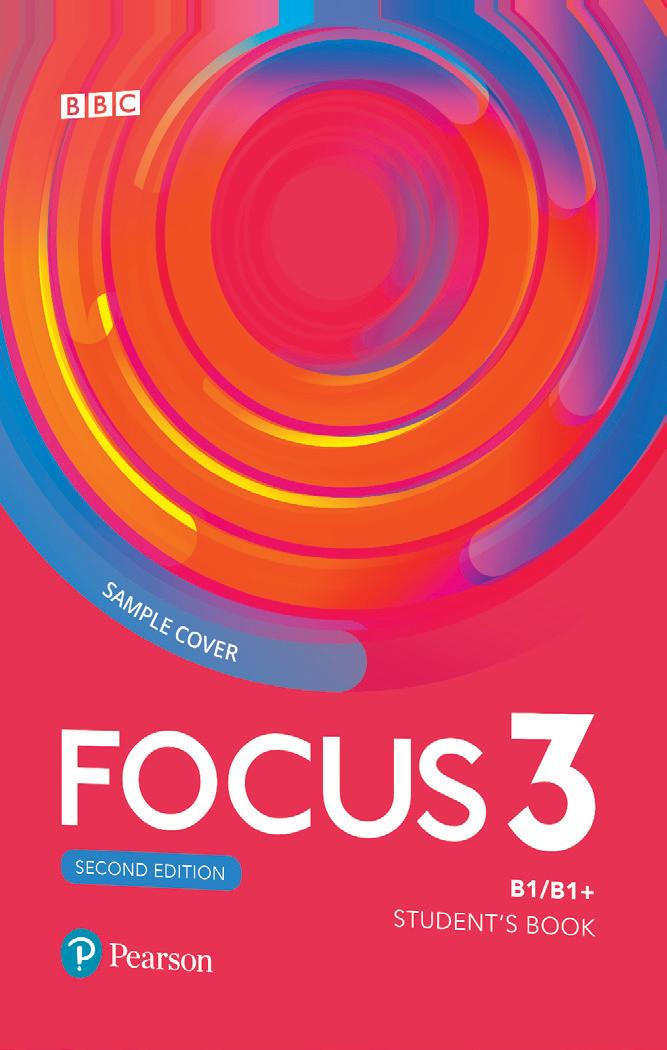






1
1
Lives people live
Lives people live
BBC
BBC
p. 116 Student accommodation
p. 116 Student accommodation
2
Science and technology
2 Science and technology
BBC
BBC
p. 118 Urban legends
p. 118 Urban legends
3
3
The arts
The arts
BBC
BBC
p. 120 The Musketeers
p. 120 The Musketeers
4
4
Home sweet home
Home sweet home
BBC
BBC
p. 122 Cave houses
p. 122 Cave houses
5
5
Time to learn
Time to learn
BBC
BBC
p. 124 South Korean schools
p. 124 South Korean schools
6
6
Just the job
Just the job
BBC
BBC
p. 126 Window cleaning
p. 126 Window cleaning
7
7
Consumer society
Consumer society
BBC
BBC
p. 128 Cheap shopping
p. 128 Cheap shopping
8
8
Well-being
Well-being
BBC
p. 130 Keeping fit
BBC p. 130 Keeping fit
pp.116–131 Video Worksheets
pp.116–131 Video Worksheets
VOCABULARYGRAMMARLISTENING
VOCABULARYGRAMMARLISTENING
pp. 4–5 Personality; un-, in-, im-, ir-, dis-; questions with like Reading: Charity
p. 15 Word list
pp. 4–5 Personality; un-, in-, im-, ir-, dis-; questions with like Reading: Charity p. 15 Word list
pp. 18–19 Phones and computers; word building; collocations
pp. 18–19 Phones and computers; word building; collocations
Listening: Famous scientists
p. 29 Word list
Listening: Famous scientists p. 29 Word list
pp. 32–33 TV programmes; adjectives; elements of a film/TV drama
pp. 32–33 TV programmes; adjectives; elements of a film/TV drama
Reading: One episode is never enough
Reading: One episode is never enough
p. 43 Word list
p. 43 Word list
pp. 46–47
pp. 46–47
Describing houses; inside a house; make or do
Describing houses; inside a house; make or do
Listening: The narrowest house in the world
Listening: The narrowest house in the world
p. 57 Word list
p. 57 Word list
pp. 60–61 Education; phrasal verbs; collocations
Reading: School systems around the world
pp. 60–61 Education; phrasal verbs; collocations Reading: School systems around the world
p. 71 Word list
p. 71 Word list
pp. 74–75 Collocations; describing jobs; phrasal verbs
pp. 74–75 Collocations; describing jobs; phrasal verbs
Listening: The worst jobs
Listening: The worst jobs
p. 85 Word list
p. 85 Word list
pp. 88–89 Shops and services; clothes and appearance; collocations
pp. 88–89 Shops and services; clothes and appearance; collocations
Reading: The truth about shopping
p. 99 Word list
Reading: The truth about shopping p. 99 Word list
pp. 102–103 Symptoms; health; phrasal verbs
pp. 102–103 Symptoms; health; phrasal verbs
Reading: Apps to keep you fit
Reading: Apps to keep you fit
p. 113 Word list
p. 113 Word list
p. 6 Present tenses –question forms; subject and object questions; wh- questions
p. 6 Present tenses –question forms; subject and object questions; wh- questions
p. 117 FOCUS VLOG
p. 117 FOCUS VLOG
GRAMMAR ANIMATION
GRAMMAR ANIMATION
p. 20 Past Continuous and Past Simple
p. 20 Past Continuous and Past Simple
p. 119 FOCUS VLOG
p. 119 FOCUS VLOG
GRAMMAR ANIMATION
GRAMMAR ANIMATION
p. 34 Comparative and superlative adjectives
p. 34 Comparative and superlative adjectives
GRAMMAR ANIMATION
GRAMMAR ANIMATION
p. 7 Vocabulary: Voluntary work; -ive, -ative, -able, -ing
p. 7 Vocabulary: Voluntary work; -ive, -ative, -able, -ing
Exam Focus: Note completion
Exam Focus: Note completion
Pronunciation Focus: Word stress – personality adjectives
Pronunciation Focus: Word stress – personality adjectives
p. 21 Becoming a scientist
p. 21 Becoming a scientist
Vocabulary: Science and scientists; collocations
Vocabulary: Science and scientists; collocations
Exam Focus: Matching
Exam Focus: Matching
Pronunciation Focus: Word stress – scientists
Pronunciation Focus: Word stress – scientists
p. 35 A street artist
p. 35 A street artist
Vocabulary: Art
Vocabulary: Art
Exam Focus:
Exam Focus:
Multiple choice
Multiple choice
Pronunciation Focus: Word stress – countries and nationalities
Pronunciation Focus: Word stress – countries and nationalities
p. 48 Present Perfect with for and since
p. 48 Present Perfect with for and since
p. 123 FOCUS VLOG GRAMMAR ANIMATION
p. 123 FOCUS VLOG GRAMMAR ANIMATION
p. 49 Teenagers’ rooms
p. 49 Teenagers’ rooms
Vocabulary: Phrasal verbs
Vocabulary: Phrasal verbs
Exam Focus: Matching
Exam Focus: Matching
Pronunciation Focus: Long vowel sounds
Pronunciation Focus: Long vowel sounds
p. 62 First Conditional GRAMMAR ANIMATION
p. 62 First Conditional GRAMMAR ANIMATION
p. 63 Dealing with exam stress
p. 63 Dealing with exam stress
Vocabulary: get
Vocabulary: get
Exam Focus: True/False
Exam Focus: True/False
Pronunciation Focus: Large numbers
Pronunciation Focus: Large numbers
p. 76 Second Conditional
p. 76 Second Conditional
p. 127 FOCUS VLOG GRAMMAR ANIMATION
p. 127 FOCUS VLOG GRAMMAR ANIMATION
p. 90 The Passive GRAMMAR ANIMATION
p. 90 The Passive
GRAMMAR ANIMATION
p. 77 Becoming an airline pilot
p. 77 Becoming an airline pilot
Vocabulary: Collocations; jobs
Vocabulary: Collocations; jobs
Exam Focus: Multiple choice
Exam Focus: Multiple choice
Pronunciation Focus: Stress in job names
Pronunciation Focus: Stress in job names
p. 91 Buying presents
p. 91 Buying presents
Vocabulary: Word families
Vocabulary: Word families
Exam Focus: Matching
Exam Focus: Matching
Pronunciation Focus: Silent letters
Pronunciation Focus: Silent letters
p. 104 Past Perfect p. 131 FOCUS VLOG GRAMMAR ANIMATION
p. 104 Past Perfect p. 131 FOCUS VLOG GRAMMAR ANIMATION
p. 105 Central Park
p. 105 Central Park
Vocabulary: Places to do sport
Vocabulary: Places to do sport
Exam Focus: Multiple choice
Exam Focus: Multiple choice
Pronunciation Focus: Diphthongs
Pronunciation Focus: Diphthongs
pp. 132–155 Grammar and Use of English Reference and practice
pp. 132–155 Grammar and Use of English Reference and practice
WORD STORE BOOKLET Word Stores 1–8, Use of English, Word practice, Word building
WORD STORE BOOKLET Word Stores 1–8, Use of English, Word practice, Word building
2
F01_Focus_SB2_Global_BrE_3888_4kor.indd 2 15.05.2019 14:07
SECOND EDITION
FOCUS
LEVEL 2

READINGGRAMMARUSE OF ENGLISHWRITINGSPEAKINGFOCUS REVIEW
READINGGRAMMARUSE OF ENGLISHWRITINGSPEAKINGFOCUS REVIEW
pp. 8–9 A brief guide to the generations
pp. 8–9 A brief guide to the generations
Exam Focus: Matching
Exam Focus: Matching
Vocabulary: Verb + preposition
Vocabulary: Verb + preposition
pp. 22–23 Science at the South Pole
pp. 22–23 Science at the South Pole
Exam Focus: Multiple choice
Exam Focus: Multiple choice
Vocabulary: Nouns and verbs; the temperature
Vocabulary: Nouns and verbs; the temperature
pp. 36–37 Superheroes
pp. 36–37 Superheroes
Vocabulary: Books; cinema; phrasal verbs
Vocabulary: Books; cinema; phrasal verbs
Exam Focus: Matching
Exam Focus: Matching
p. 10 Verb + -ing or verb + to infinitive Reading: Attitude to clothes quiz
p. 10 Verb + -ing or verb + to infinitive Reading: Attitude to clothes quiz
GRAMMAR ANIMATION
GRAMMAR ANIMATION
p. 24 used to Listening: Communication in the past
p. 24 used to Listening: Communication in the past
GRAMMAR ANIMATION
GRAMMAR ANIMATION
p. 38 Present Perfect with just, already, (not) yet and Past Simple
Reading: A School for Stars
p. 38 Present Perfect with just, already, (not) yet and Past Simple Reading: A School for Stars
GRAMMAR ANIMATION
GRAMMAR ANIMATION
p. 121 FOCUS VLOG
p. 121 FOCUS VLOG
pp. 50–51 People who don’tlive in traditional houses
pp. 50–51 People who don’t live in traditional houses
Vocabulary: Landscape features; describing places; collocations
Vocabulary: Landscape features; describing places; collocations
Exam Focus: Gapped text
Exam Focus: Gapped text
pp. 64–65 Different, not less
pp. 64–65 Different, not less
Vocabulary: Nouns and verbs; of and for
Vocabulary: Nouns and verbs; of and for
Exam Focus: Matching
Exam Focus: Matching
pp. 78–79 Personality types and careers
pp. 78–79 Personality types and careers
Vocabulary:
Compound nouns; word families
Vocabulary: Compound nouns; word families
Exam Focus: Matching
Exam Focus: Matching
pp. 92–93 The brains behind Amazon.com
pp. 92–93 The brains behind Amazon.com
Vocabulary: Shopping
Vocabulary: Shopping
Exam Focus: Multiple choice
Exam Focus: Multiple choice
pp. 106–107 The tower that sucks in smog and spits out clean air
pp. 106–107 The tower that sucks in smog and spits out clean air
Vocabulary: Pollution; word families
Vocabulary: Pollution; word families
Exam Focus: Openended questions
Exam Focus: Openended questions
p. 52 Future forms: Present Continuous, be going to and will Listening: A birthday party
p. 52 Future forms: Present Continuous, be going to and will Listening: A birthday party
GRAMMAR ANIMATION
GRAMMAR ANIMATION
p. 66 Defining relative clauses
p. 66 Defining relative clauses
Reading: The British Students’ Manifesto
Reading: The British Students’ Manifesto
GRAMMAR ANIMATION
GRAMMAR ANIMATION
p. 125 FOCUS VLOG
p. 125 FOCUS VLOG
p. 80 Modal verbs for obligation and permission
p. 80 Modal verbs for obligation and permission
Listening: Working conditions
Listening: Working conditions
GRAMMAR ANIMATION
GRAMMAR ANIMATION
p. 94 Quantifiers
p. 94 Quantifiers
Reading: TOMS shoes
Reading: TOMS shoes
GRAMMAR ANIMATION
GRAMMAR ANIMATION
p. 129 FOCUS VLOG
p. 129 FOCUS VLOG
p. 108
Speech
Reported
p. 108 Reported Speech
Reading: The oldest runner
Reading: The oldest runner
GRAMMAR ANIMATION
GRAMMAR ANIMATION
p. 11 so and such Multiple choice cloze
p. 11 so and such Multiple choice cloze
pp. 12–13
pp. 12–13
Writing Focus: A personal email/ letter
Writing Focus: A personal email/ letter
Language Focus: Adjective + preposition
Language Focus: Adjective + preposition
p. 14 Showing interest ROLE-PLAY
p. 14 Showing interest ROLE-PLAY
pp. 16–17
pp. 16–17
p. 25 Linkers and time expressions
p. 25 Linkers and time expressions
Multiple choice cloze
Multiple choice cloze
p. 39 too and not enough
p. 39 too and not enough
Sentence transformation
Sentence transformation
pp. 26–27
pp. 26–27
Writing Focus: A story
Writing Focus: A story
Language Focus: Informal linkers
Language Focus: Informal linkers
pp. 40–41
pp. 40–41
Writing Focus: A film review
Writing Focus: A film review
Language Focus: Adjectives to describe films, plots, screenplays etc.
Language Focus: Adjectives to describe films, plots, screenplays etc.
p. 28 Telling a story ROLE-PLAY
p. 28 Telling a story ROLE-PLAY
p. 42 Describing a photo ROLE-PLAY
p. 42 Describing a photo ROLE-PLAY
pp. 30–31
pp. 30–31
pp. 44–45
pp. 44–45
p. 53 Adverbs
p. 53 Adverbs
Sentence transformation
Sentence transformation
pp. 54–55
pp. 54–55
Writing Focus: A blog entry
Writing Focus: A blog entry
Language Focus: Punctuation –commas
Language Focus: Punctuation –commas
p. 56 Making suggestions ROLE-PLAY
p. 56 Making suggestions ROLE-PLAY
pp. 58–59
pp. 58–59
p. 67 Future time and conditional clauses
p. 67 Future time and conditional clauses
Sentence transformation
Sentence transformation
p. 81 Adjectives ending in -ed and -ing Multiple choice cloze
p. 81 Adjectives ending in -ed and -ing Multiple choice cloze
p. 95 Indefinite
pronouns: someone, anything, nowhere, everybody, none, etc.
p. 95 Indefinite pronouns: someone, anything, nowhere, everybody, none, etc.
Sentence transformation
Sentence transformation
p. 109 Phrasal verbs
Gapped sentences
p. 109 Phrasal verbs Gapped sentences
pp. 68–69
pp. 68–69
Writing Focus: An enquiry
Writing Focus: An enquiry
Language Focus: Indirect questions
Language Focus: Indirect questions
pp. 82–83
pp. 82–83
Writing Focus: A job application
Writing Focus: A job application
Language Focus: Formal language in a job application letter
Language Focus: Formal language in a job application letter
pp. 96–97
pp. 96–97
Writing Focus: A formal written complaint
Writing Focus: A formal written complaint
Language Focus: Formal language
Language Focus: Formal language
pp. 110–111
pp. 110–111
Writing Focus: A reader‘s comment –linkers
Writing Focus: A reader‘s comment –linkers
Language Focus: Structures with make
Language Focus: Structures with make
p. 70 Giving an opinion; agreeing and disagreeing ROLE-PLAY
p. 70 Giving an opinion; agreeing and disagreeing ROLE-PLAY
p. 84 Asking for and giving advice ROLE-PLAY
p. 84 Asking for and giving advice ROLE-PLAY
pp. 72–73
pp. 72–73
pp. 86–87
pp. 86–87
p. 98 Shopping ROLE-PLAY
p. 98 Shopping ROLE-PLAY
pp. 100–101
pp. 100–101
p. 112 A doctor’s appointment ROLE-PLAY
p. 112 A doctor’s appointment ROLE-PLAY
p.156 Prepositions p. 157 Phrasal verbs p. 158 Pronouns and numerals p. 159 Irregular verbs
pp. 114–115
pp. 114–115 3
14:07
F01_Focus_SB2_Global_BrE_3888_4kor.indd 3 15.05.2019 14:07
FOCUS SECOND EDITION LEVEL 1
0 Grammar: Imperatives; to be; subject pronouns; demonstrative pronouns; plural nouns; possessive adjectives; possessive ’s; can/can’t; prepositions; there is/there are; have got
Vocabulary: Alphabet; classroom language; numbers; countries and nationalities; age; colours; adjectives; objects; family; common verbs; rooms and furniture; gadgets; days of the week; months and seasons; times; ordinal numbers.

Writing Focus: An informal email Expressing preferences
Writing Focus: An email of invitation Ordering food
Writing Focus: An email of request Describing a photo
Writing Focus: A personal profile on a blog
Writing Focus:
Going to the hairdresser’s
Asking for and giving
Writing Focus: A description of an
Asking for and giving advice
Writing Focus:
Asking for and giving
Writing Focus:
Agreeing and disagreeing
T3
VOCABULARY GRAMMAR WRITING SPEAKING 1 Family and Friends BBC Have, go and play Collocations Prepositions
Wh-
VLOG GRAMMAR ANIMATION
Present Simple Present Simple: Yes/No and
questions FOCUS
2 Food BBC Food containers Food products Phrases related to food
and uncountable nouns Articles FOCUS VLOG GRAMMAR ANIMATION
ROLE-PLAY
Countable
ROLE-PLAY 3 Work BBC Jobs Work and job Prepositions
Continuous Present
Present Continuous FOCUS VLOG GRAMMAR ANIMATION
Present
Simple and
4 People BBC Appearance Adjective order Personality
and superlative adjectives have to
don’t
to FOCUS VLOG GRAMMAR ANIMATION
Comparative
/
have
5 Education BBC Types of school At school Exams must/mustn’t
should/ shouldn’t
Simple: was
were
could FOCUS VLOG GRAMMAR ANIMATION
,
Past
/
,
A personal email
information ROLE-PLAY
Health and sport BBC Sports Go, do and play Sportspeople
Simple
Simple negatives and questions FOCUS VLOG GRAMMAR ANIMATION
6
Past
Past
event
7 Travel BBC Holidays and transport Book, make and visit Accommodation
Perfect with ever/ never
perfect + just/yet/ already FOCUS VLOG GRAMMAR ANIMATION
Present
Present
An email
enquiry
of
directions ROLE-PLAY 8 Nature BBC Geography Animals Collocations Future with will be going to FOCUS VLOG GRAMMAR ANIMATION
An opinion and arguments
ROLE-PLAY F02_Focus_SB2_Pol_6989_promo_1kor.indd 4 17.05.2019 13:13
FOCUS SECOND EDITION LEVEL 3
VOCABULARYGRAMMAR USE OF ENGLISHWRITINGSPEAKING

1
A new look
BBC
2 It’s just a game
BBC
3 On the go
BBC
4
Eat, drink and be healthy
BBC
5 Planet Earth
BBC
Clothes and accessories
Style and fashion –prepositions
Personality
Phrasal verbs Collocations
People in sport
Dynamic and state verbs
Present Perfect Continuous
FOCUS VLOG
GRAMMAR ANIMATION
Narrative tenses Verb patterns
GRAMMAR ANIMATION
Means of transport Noun phrases Collocations Synonyms for trip
Fruit and vegetables
Describing food Collocations
Present and past speculation used to and would
FOCUS VLOG
GRAMMAR ANIMATION
Future forms
Future Continuous and Future Perfect
FOCUS VLOG
GRAMMAR ANIMATION
Phrasal verbs Collocations Word families
6
Good health
BBC
7
Entertain me
BBC
8
Modern society
BBC
Parts of the body Injuries Body idioms
Entertainment People in entertainment
Phrasal verbs
Crime and criminals
People involved in a crime case The justice system
Articles: no article, a/ an or the Non-defining relative clauses
FOCUS VLOG
GRAMMAR ANIMATION
Second Conditional; wish/if only
Third Conditional
GRAMMAR ANIMATION
Reported Speech –statements
Reported Speech –questions and imperatives
GRAMMAR ANIMATION
The Passive
Have something done
GRAMMAR ANIMATION
Word formation –suffixes
Writing Focus: A description of a person
Language Focus: Tentative language
Describing a photo
ROLE-PLAY
so, too, neither (nor), not either
FOCUS VLOG
Phrasal verbs
Writing Focus: A story
Language Focus: Linkers to describe events in a sequence
Writing Focus: A personal email
Language Focus: Ellipsis
Question tags
Writing Focus: Formal / informal style
Language Focus: Indirect questions
Prepositions at the end of clauses
Writing Focus: A ‘for and against’ essay
Language Focus: Linkers
Clauses of purpose
FOCUS VLOG
Writing Focus: A factual article
Language Focus: Comment and opinion adverbs
Countable, uncountable and plural nouns
FOCUS VLOG
Reflexive pronouns
FOCUS VLOG
Writing Focus: An article reviewing an event
Language Focus: Modifiers with base and extreme adjectives
Writing Focus: An opinion essay
Language Focus: Giving your opinion and emphasising a point
Asking for and giving an opinion; agreeing and disagreeing
ROLE-PLAY
Asking for and giving advice
ROLE-PLAY
In a restaurant –ordering food, asking for infor mation with indirect questions
ROLE-PLAY
Expressing and justifying an opinion; describing and contrasting pictures
ROLE-PLAY
At the doctor’s surgery –describing symptoms and discussing treatment
Asking for permission; polite requests
ROLE-PLAY
Opinions: talking about advantages and disadvantages
ROLE-PLAY
13:13 T4
F02_Focus_SB2_Pol_6989_promo_1kor.indd 5 17.05.2019 13:13
FOCUS SECOND EDITION LEVEL 4
VOCABULARY GRAMMAR USE OF ENGLISH WRITING SPEAKING

1
Do your best BBC
2 It takes all sorts
BBC
3 A place to live
BBC
4
The cost of living
BBC
5
The world at your feet
BBC
6
True or false?
BBC
7
Log on BBC
8
Around the globe
BBC
Education Collocations
Phrasal verbs
Synonyms –personality adjectives
Family, celebrations and religious ceremonies
Compound nouns
Verb-noun collocations
Common phrases
Landscapes and cityscapes
Dependent prepositions
Adjective-noun collocations
Useful phrases to describe cities
Shopping and money Shops
Phrasal verbs
Money idioms
Collocations –buying and selling
Employment Job titles
Phrasal verbs Collocations Word families
Truth and falsehood
Adjectives to describe people
Phrases with take Compound adjectives
Using computers
Collocations to do with Internet use Health issues
Collocations in set phrases
The natural world
Pollution
Land and water
Hazards and pollutants
Compound nouns
Present and past habits
Verb patterns
FOCUS VLOG
Past Perfect Simple and Continuous Relative clauses
FOCUS VLOG
Future forms including the Future Perfect Continuous Quantifiers
FOCUS VLOG
Question tags and reply questions
Present and past modal structures
-ing forms A CV and a covering letter
Language Focus: describing education, work experience and skills
Collocations An article
Language Focus: participle clauses to express reason
Determiners –special cases A ‘for and against’ essay
Language Focus: expressing concession
Describing a photo; speculating; answering related questions
Asking for and giving an opinion; agreeing and disagreeing
Reported speech Reporting verbs
FOCUS VLOG
Conditional clauses – alternatives to if Mixed conditionals
FOCUS VLOG
Advanced passive forms Passive reporting structures
FOCUS VLOG
Unreal past and past regrets – wish, if only, it’s time and would rather Emphasis – cleft sentences and inversion
FOCUS VLOG
Modality –alternative structures
FOCUS VLOG
A formal email (describing an incident and making a complaint)
Language Focus: expressing cause and result
Phrasal verbs An opinion essay
Language Focus: introducing reasons in formal writing
Word families –suffixes A review
Language Focus: expressing contrast
Easily confused words A narrative
Language Focus: describing ways of walking, speaking and looking
Word families –prefixes
A letter to an editor
Organising a place to live; suggesting, agreeing to and objecting to a course of action
ROLE-PLAY
Making and justifying choices; evaluating options
ROLE-PLAY
Problem solving; expressing annoyance
ROLE-PLAY
Ethical issues; expressing opinions tentatively and adding comments
Clarification
ROLE-PLAY
Giving a presentation
T5
Language Focus: describing the location of a place F02_Focus_SB2_Pol_6989_promo_1kor.indd 6 17.05.2019 13:13
FOCUS SECOND EDITION LEVEL 5
VOCABULARYGRAMMARUSE OF ENGLISHWRITINGSPEAKING

1 The ties that bind
BBC
2 Learning for life
BBC
3 Let`s eat
BBC
4 The new thing
BBC
5 All in a day’s work
BBC
6 Journeys
BBC
7 Express yourself
BBC
8 Text me!
BBC
9 Future generations
BBC
Personality and relationships Adjectives Collocations Phrases
Studying and exams
Exaggerated synonyms Phrasal verbs
Phrases–relaxed/ stressed
Cooking and eating Food Kitchen/dining sounds Collocations
Music industry Compounds
Compounds phrases –success and failure Noun formation
Employment and career Phrasal verbs
Colloquial phrases Collocations – work and money
Travel and sightseeing Phrasal verbs Suffixes
Colloquial phrases
Theatre and musicals
Exaggerated synonyms
Theatre words Compound adjectives
Information and the mind Prefixes Verb-noun collocations Phrases with mind
Global warming Synonym Environmental problems Animal idioms
Perfect and continuous aspect
Future in the pastA formal email/letterSpeculating about appearance
SpeculatingAccuracy with articles An article Giving supporting examples
Transitive and intransitive phrasal verbs
Particles in phrasal verbs A proposal Responding appropriately in conversation
Infinitives Sentence modifiersA review of a product Agreeing and disagreeing
Gerunds Prepositional phrases An essay Buying time
Advanced comparative structures
Words and phrases with ever A report Comparing photos
Advanced conditionals Phrases with if A review of a book/ film Discussing advantages and disadvantages
Reporting verb patterns Passive reporting structures A formal email/ letter Adding emphasis
Inversion after adverbials
Extra it Essay introductionsSpeculating about photos
13:13 T6
F02_Focus_SB2_Pol_6989_promo_1kor.indd 7 17.05.2019 13:13

























































































































































































VOCABULARY





Describing houses • inside a house • make or do I can use language related to rooms, homes, buildings and their parts.
SHOW WHAT YOU KNOW
1 Think about your house and complete the task in five minutes.
• List all the different rooms in your house.
• List at least six items you can find in each room – furniture, decoration, objects, etc.
2 Compare your lists with a partner. What is your total number of different words for rooms and items in rooms?

CAVE


Watch the BBC video. For the worksheet, go to page 122.













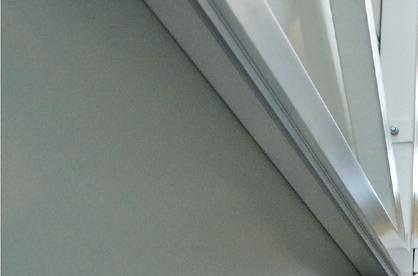











IN THE WORLD!












Rendering of the Keret House design, a cross-section, copyright Polish Modern Art Foundation
Etgar Keret in Keret House, photo by Bartek Warzecha, copyright Polish Modern Art Foundation
Keret House seen from Żelazna Street, photo by Tycjan Gniew Podskarbiński, copyright Polish Modern Art Foundation




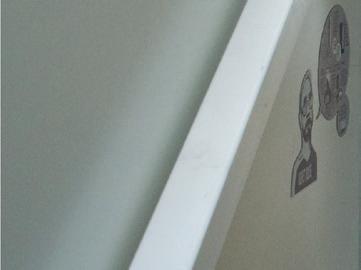


Focus Second Edition 2, Unit 4, Student’s Book 44 46
4.1 Home sweet home
where the heart is. A
Home is
proverb
HOUSES
1 2 3 1 M04_Focus_SB2_Global_BrE_3888_5kor.indd 46 15.05.2019 12:46
3 2.5 Listen and answer the questions.
1 Where is Keret House?
2 What does Etgar Keret think of the house?
3 How wide is Keret House?
4 How many floors are there?
5 How many people can live in it?
4 SPEAKING Discuss whether or not you would like to live in the Keret house. Give reasons for your answers.



Go to WORD STORE4 page 9
WORD STORE 4A Describing houses
5 2.6 Complete WORD STORE 4A with the words and phrases in the box. Then listen, check and repeat. a block of flats brick concrete cosy glass the ground floor historic in the city centre metal modern open-plan spacious upstairs
6 Replace the underlined phrases with words or phrases with a similar meaning in WORD STORE 4A. Which sentences are true for you?
I know someone who lives in a …
1 detached house with only one floor. a bungalow 2 house which is joined to a neighbour’s house.
3 house on the edge of the city.
4 small, traditional house in a village.
5 modern house in an area with other similar houses.
6 flat that is very warm and comfortable. 7 large flat that is without many interior walls.

8 flat at the top of a building in the middle of the city.









7 SPEAKING Describe a flat or house that you know to your partner.
WORD STORE 4B Inside a house
8 2.7 Translate the words in WORD STORE 4B. Which of the items can you see in Keret House? Listen and repeat.
9 2.8 We asked three people: ‘Would you like to live in Keret House?’ Listen and complete the table.
ANSWERSPEAKERREASONS
Yes
Maybe
No
WORD STORE 4C make or do
10 2.9 Complete WORD STORE 4C with the nouns in the box. Then listen, check and repeat.



the washing dinner the ironing the gardening the washing-up a mess a noise the shopping
11 SPEAKING Complete the questions with the correct form of make or do. Then ask and answer the questions.
1 Did you your bed this morning?
2 Do your neighbours ever a noise?
3 Do you like the washing-up?
4 Who the cooking in your house?
5 Have you ever dinner for somebody?
6 Where does your family usually the shopping?
12:46 47
M04_Focus_SB2_Global_BrE_3888_5kor.indd 47 15.05.2019 12:46
2 3









4.2



GRAMMAR



Present Perfect with for and since
I can use the Present Perfect with for and since to talk about duration.
1 SPEAKING Tick the places where you have slept. What was the most unusual place? Tell your partner.
• in my bed • in a hotel
• on a floor • on a train
• on a couch • other
2 SPEAKING Read US TODAY. What is couchsurfing? Discuss whether you would like to do it. Give reasons for your answers.
US TODAY

We asked CS employee, Dan, about the world’s largest travel community.
What is it?
A worldwide travel network connecting travellers with people who offer free accommodation.
Who is it for?


People who don’t want to stay in hotels but want to meet local people and experience new cultures.
How much does it cost?
Nothing! It’s free.
How long have you worked for CS?
I’ve been here since it started in 2004. I’ve worked with people from all over the world for more than ten years. Together we want to create a global community.
3 Read the GRAMMAR FOCUS. Complete the examples using the Present Perfect forms in blue in Exercise 2.
GRAMMAR FOCUS
Present Perfect with for and since
You use the Present Perfect to talk about unfinished situations that started in the past and continue in time ‘up to now’.
• You use How long to ask about the length of time ‘up to now’.
How long 1 you for CS?
• You use since when the answer is a point in time: e.g. since 1998, since last week, since I was born. I 2 here since it started in 2004.
• You use for when the answer is a period of time: e.g. for six hours, for a few days, for a long time. I 3 with people from all over the world for more than ten years.
4 2.10 Choose for or since and complete the comments with the Present Perfect form of the verbs in brackets. Then listen and check.

Host
Couchsurfer
I 1’ve been (be) a member 2for / since three years now. 3For / Since I became a member, I 4 (stay) in thirty-two countries in different types of accommodation. I 5 (sleep) in a luxury studio apartment in Manhattan, on a houseboat in Amsterdam and in a basement flat in London – all for free!
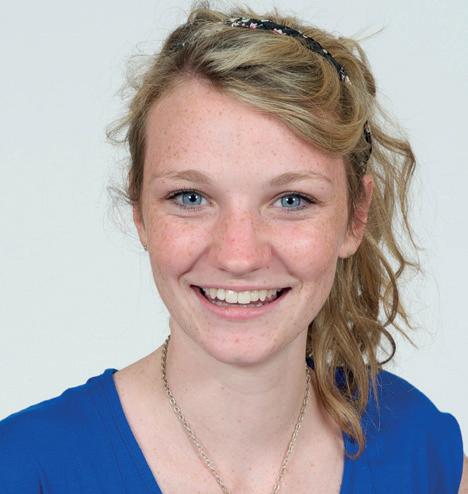
I 6 (be) a couchsurfing host 7for / since two years now and I 8 (already/meet) more than thirty people. At the moment, Miki is visiting from Tokyo. I 9 (only know) her 10for / since a week, but I’m sure we’ll remain friends. Miki is happy too – she 11 (study) English 12for / since ten years, but she 13 (never/have) the chance to speak with a native speaker before. She 14 (be) here 15for / since nearly a week, but she 16 (not feel) homesick because she says I make her feel at home.
5 Complete the second sentence so that it has a similar meaning to the first.
1 My dad was born in our house.
My dad has lived (live) in our house since he was born.
2 My dad gave my mum this watch when she was forty.
My mum (have) this watch she was forty.
3 I met my best friend two years ago.
I (know) my best friend two years.
4 I bought these trainers last Christmas.
I (not buy) any new trainers last Christmas.
5 I joined this English class three months ago.
I (be) in this English class three months.
6 I had breakfast at 7 a.m.
I (not eat) anything 7 a.m.
6 Write true sentences from the prompts. Use the Present Perfect and since or for
1 I/know/(name of your neighbour) …
2 I/live in/(name of your neighbourhood) …
3 I/like/(name of your favourite band) …
4 I/have/(make of your phone) …
5 I/be interested in/(name of a subject) …
6 My dad/have/(type of your dad’s car) …
7 SPEAKING Use the sentences in Exercise 6 to make dialogues. Then ask and answer as in the example.
A: Who is your neighbour? B: Barry.
A: How long have you known him? B: For five years.
FOCUS VLOG Where people live
10 2.11 Watch or listen to the Focus Vlog. For the worksheet, go to page 123.
Grammar page 141
Focus Second Edition 2, Unit 4, Student’s Book
48
M04_Focus_SB2_Global_BrE_3888_5kor.indd 48 15.05.2019 12:46










4.3



LISTENING
Matching
4 SPEAKING Discuss which teenager's attitude is most similar to your own.



I can identify key details in a simple narrative about teenagers’ rooms.

1 SPEAKING Look at the photo. How different or similar is the bedroom to your own? Discuss with a partner. Think about:
1 the size: bigger/smaller, more/less spacious, the same
2 the decoration: more/less modern, colour of walls/curtains/carpet, posters, etc.
3 the furniture: bookcase, bed, wardrobe, desk, etc.
4 other details: more/less tidy, clothes, musical instruments, computer, etc.
2 2.12 Listen to five teenagers describing their rooms. Are statements 1–5 true (T) or false (F)?
1 Speaker 1 lives in a quiet house.
2 Speaker 2 isn’t like her sister.
3 Speaker 3 doesn’t like music.
4 Speaker 4 is often out.
5 Speaker 5 never invites her friends round.
EXAM FOCUS Matching
3 2.12 Listen to the teenagers again. Match speakers 1–5 with statements A–F. There is one extra statement.
Speaker 1: Speaker 3: Speaker 5:
Speaker 2: Speaker 4:
A uses his/her room as a creative space.
B likes to escape to his/her room and have private time.
C spends time with friends in his/her room.
D likes having an untidy room.
E just does homework and sleeps in his/her room.
F shares his/her room with someone.
5 2.13 Listen to two teenagers talking about their most treasured possessions and complete the information.
DAFYDD
1 a laptop: has had it for , a present
2 a guitar: has had it for , it belonged to his
3 a Welsh ag: he feels of being Welsh

KAREN

1 a collection of animals: has had them since she , her favourite is
2 a bedside lamp: a present from her , brought from
3 a collection of shells: they are souvenirs from , she has collected them since she
6 2.13 Choose the correct preposition and try to complete the sentences from memory. Then listen again and check.
1 Dafydd’s is on / next to his desk.
2 His is on / in the corner above / next to the bookcase.
3 His is onto / on the wall onto / above his bed.
4 Karen’s is on top of / above the wardrobe.
5 Karen’s is on / in her bedside table.
6 Her is in / on the bottom shelf of her bookshelves, which are opposite / in front of her bed.
7 SPEAKING What are your own most treasured possessions? Where is everything in your room? Tell your partner.
PRONUNCIATION FOCUS
8 2.14 Listen and repeat the words with long vowel sounds. Then put them in an appropriate column in the table.
art calm floor free meet new room sea start surf third true wall warm work /iː/ /uː/ /ɔː/ /ɜː/ /ɑː/ art
9 2.15 Listen, check and repeat.
WORD STORE 4D Phrasal verbs
10 2.16 Complete WORD STORE 4D with the particles in the box. Then listen, check and repeat.
12:46
49
M04_Focus_SB2_Global_BrE_3888_5kor.indd 49 15.05.2019 12:46








4.4



READING
Gapped text



I can understand the main points in a simple descriptive text on a familiar topic.
1 SPEAKING Look at the photos and discuss the questions.
1 What are the advantages of living in each place?
2 What are the disadvantages?
3 Would you like to live there? Why/Why not?
I suppose one advantage of living in the trees is that you would have fantastic views …
2 2.17 Which words in the box describing landscape features can you see in the photos? Use your dictionary if necessary. Then listen and repeat.
a cave a crater an island a rainforest rocks ruins stilts a treehouse a turquoise ocean a volcano
3 Read the text and answer the questions.
1 Why do the Korowai Tribe build their houses in trees?
2 Why do people in Coober Pedy prefer living underground?
3 Why do people on Aogashima want to live in a volcano?
4 Why do the Bajau people feel uncomfortable on land?
5 Why have most people recently moved from Petra to a nearby village?
EXAM FOCUS Gapped text
4 Read the text again. Complete gaps 1–5 with sentences A–F. There is one extra sentence.
A Alternatively you can take a helicopter and it only takes two hours.
B This means that they have better access to water, electricity and Wi-Fi.
C In fact, income from tourism is helping to keep their traditions alive.
D It has to be strong because sometimes a family of twelve people live there.
E However, if you look closer, you can see chimneys on the surface of the dry landscape.
F Also, they start hunting when they’re just eight years old.



People who don’t live in traditional houses
2.18




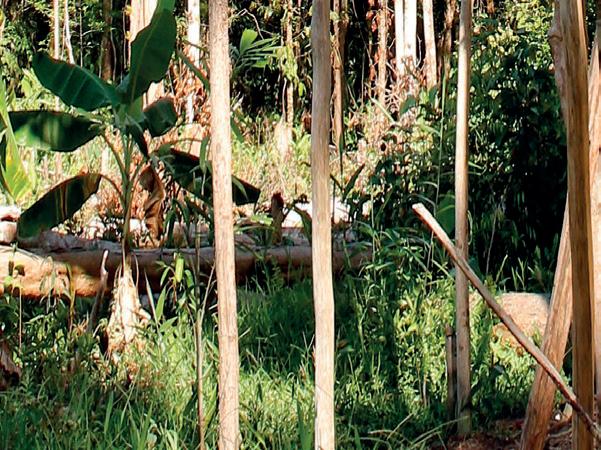
1 Living in trees

5





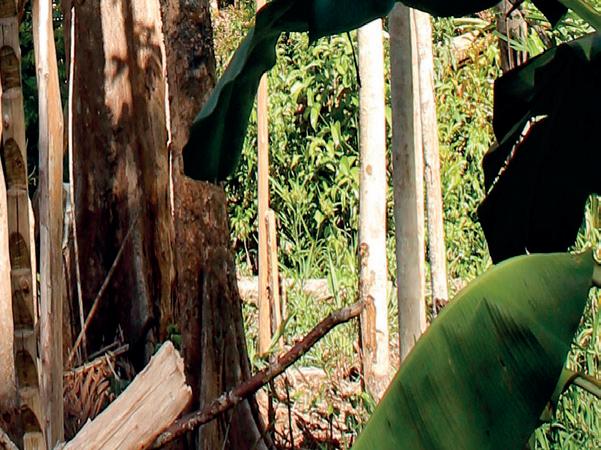

The Korowai Tribe of Papua New Guinea are strong and good at climbing. They have to be! They live in treehouses, sometimes fortyfive metres above the ground. The dense rainforest is hot and humid; there are insects and dangerous animals. Treehouses protect the tribe from these dangers on the ground. They use material from the forest to build the houses. They cut o the top of a tree and build the floor first. 1 They use a ladder to get up and down. Imagine the breathtaking views from one of these treehouses!









Focus Second Edition 2, Unit 4, Student’s Book
50
M04_Focus_SB2_Global_BrE_3888_5kor.indd 50 15.05.2019 12:46




2 Living underground


In the desert of Southeast Australia, 500 miles away from the nearest city, is a mining town called Coober Pedy. On the sandy surface, there isn’t much to see. 2 Almost all of the 3,500 residents live underground and work in the opal mines. To escape from scorching temperatures, they have created an impressive underground world where you’ll find everything from a bookstore to a church, and even a hotel.

3 Living in a volcano

5 Match ‘clues’ 1–3 with their function a–c in a text.
1 she, he, it, her, him, one, this, that, here, there
2 But, However, Alternatively, Instead
3 Also, In addition, For example, In fact
a they introduce additional information b they introduce contrasting information c they refer back to something in the text
6 Underline examples of ‘clues’ in sentences
A–F in Exercise 4. Do they ‘add’, ‘contrast’ or ‘refer’? There is one sentence without a ‘clue’.

Aogashima is a Japanese island in the Philippine Sea. Over 230 years ago, a volcanic eruption killed half of its population. Now about 200 people live in the old volcanic crater. They try not to worry too much about another eruption. They love living on the island – there are no tra c jams or crowds of people. Fishing, hiking, camping and swimming are popular activities. Aogashima’s natural hot springs and lush vegetation attract a lot of visitors, but the island is not so easy to reach. You can take a fourteen-hour boat trip from Tokyo. 3
4 Living on the sea
The Bajau /ˈbɑːdʒaʊ/ people of Borneo in Southeast Asia, also called sea gypsies, live on boats or houses on stilts in the turquoise Pacific Ocean. When they go on land, they feel ‘landsick’. Bajau children don't go to school on land. But from an early age they learn to swim and dive. 4 The best Bajau divers can dive 20 metres to the bottom of the ocean to search for fish. Young Bajau children spend so much time in the ocean that their eyes develop excellent underwater vision.
5 Living in caves

7 2.19 Complete the phrases with the words in blue in the text. Then listen, check and repeat.
1 attract
2 breathtaking
3 historic
4 hot and
5 mining
6 trading
7 traffic
8 Complete the questions with the words in Exercise 7.
1 Are there any monuments in your city?
2 Is your city a busy centre?
3 Which parts of your country a lot of visitors?
4 Where can you see breathtaking ?
5 Does it ever get hot and in your country?
6 Are there any towns in your country?
7 Where in your city are the worst jams?
9 SPEAKING Ask and answer the questions in Exercise 8.
WORD STORE 4E Collocations
The ancient city of Petra is a popular tourist destination. It is located in the rose-coloured mountains of south-western Jordan and was once a busy trading centre. Then, its residents abandoned the city and for thousands of years only the Bedouin, a nomadic tribe, lived in caves among the spectacular historic ruins. However, the government has recently decided to move them to a nearby village to protect Petra. But the Bedouins’ way of life has not changed much. 5 Some of them work in Petra, selling souvenirs or transporting tourists on horses, camels and donkeys around the historic monuments



10 2.20 Complete WORD STORE 4E with the words in the box. Then listen, check and repeat. Write an example sentence for each collocation.


12:46 51
10 15 20 25 30 35 40 45 50 55 60 M04_Focus_SB2_Global_BrE_3888_5kor.indd 51 15.05.2019 12:46









4.5



GRAMMAR
4 2.22 Choose the most appropriate future form. Then listen and check.



Future forms: Present Continuous, be going to and will
I can talk about the future using the Present Continuous, going to and will.
1 SPEAKING What makes a good house party? Add your own ideas to the ones below and put them in order of importance. Then compare your ideas with a partner.
decoration food and drink furniture lighting music people theme
2 2.21 Read and listen to the dialogue. Then answer the questions.
1 Why is Tony having a party?
2 Where and when is he having it?
3 How is Luisa going to help?
Tony: I’m having a birthday party on the 25th. Can you come?
Luisa: That’s next Saturday, right? Yes, that sounds great. Are you having it at home?
Tony: No, our apartment isn’t big enough. I’m using my aunt and uncle’s house. They’re really nice – they say it’s fine.
Luisa: That’s kind of them – do they know how many friends you’ve got?
Tony: Not yet. I’m going to tell them later. We’ll probably use the basement. It’s huge.
Luisa: A basement? Are you going to decorate it?
Tony: I suppose so. I’m not very good at that sort of thing.
Luisa: Don’t worry, I’ll help you. What are you doing later?
Tony: I’m going to text everybody with the invitation now, but after that I’m free.
3 Read the GRAMMAR FOCUS. Complete the examples using the future forms in blue in Exercise 2. Then underline more examples of each future form in the text.
GRAMMAR FOCUS
Future forms: Present Continuous, be going to and will
• You use the Present Continuous for future arrangements. You often mention a time, a date or a place. I 1 a birthday party on the 25th.
• You use be going to for future intentions. You have already decided to do something and you tell people about it. I 2 tell them later.
• You use will for spontaneous decisions. You often use expressions like: I think I’ll …, I’ll probably … , Don’t worry, I’ll … Don’t worry, I 3 help you.
Tony: Two of my friends 1are helping / will help me prepare the room on Saturday afternoon. We 2’re going to hang / ’ll hang sheets on the walls and the ceiling. Then we 3’re going to put / ’re putting coloured lights everywhere. We 4’ll have / ’re having a band and a DJ from eight to midnight. I’ve already booked them.
Aunt: Okay, I think I 5’ll warn / ’m going to warn the neighbours!
Tony: We’ve decided to have a fancy dress theme – everybody 6will come / is coming as their favourite film character.
Uncle: Oh good, I think I 7’ll come / ‘m going to come as Captain Jack Sparrow!
Aunt: No, we 8’ll go out / ’re going out to the theatre, remember? I told you yesterday.
Uncle: I know, I was joking. Now, what are you 9eating / going to eat?
Tony: That’s all arranged. Mum 10will make / is making some pizzas.
Aunt: And what about the cleaning the next day?
Tony: Oh, erm … Don’t worry, I 11’ll do / ’m doing that with my friend Luisa. She won’t mind!
5 Complete the email with appropriate future forms in gaps 1–6 and your own ideas in gaps a–c.
Hi Amy
You know I 1 (move) house next week. Well, I’ve decided that I 2 (have) a house-warming party in the new house. The theme is Superheroes, so I 3 (dress up) as a . You know my mum’s a fantastic cook so she 4 (make) b . I think everybody 5 (like) that. I’m not sure about the music. I think I 6 (get) a DJ and ask him to play lots of c
6 SPEAKING You are responsible for organising an end-of-term party for your school year. Discuss with a partner. Follow the instructions.
1 Make some decisions about location, food and drink, music, decoration, theme, etc.
2 Write an email to the class to explain your ideas. Use all three future forms. As a class, decide whose party ideas are best.
Grammar page 142

Focus Second Edition 2, Unit 4, Student’s Book
52
M04_Focus_SB2_Global_BrE_3888_5kor.indd 52 15.05.2019 12:46










4.6




USE OF ENGLISH


Adverbs



I can form adverbs and qualify them with really/quite/very.

1 SPEAKING Look at the photos. What are the advantages and disadvantages of each place? Where would you like to spend the weekend? Discuss with a partner.
2 2.23 Listen to Robbie trying to decide which place to go to. How many of your ideas in Exercise 1 does he mention? What does he decide to do and why?
3 2.23 Listen again and choose the correct option.
1 She doesn’t speak French very well / very well French
2 I speak more well / better than she does.
3 I stay up late / lately
4 That sounds extreme / extremely boring.
5 Everybody goes to bed really early / real early
6 Time goes unbelievably slowly / unbelievably slow in the country.
4 Read the LANGUAGE FOCUS. Form appropriate adverbs from the adjectives in bold in sentences 1–6 below. Then put the words in the correct order to make sentences.
LANGUAGE FOCUS
Adverbs
• You use adverbs to modify verbs, adjectives and other adverbs.
• You form adverbs by adding -ly, -y, -ily to adjectives: slow => slowly, unbelievable => unbelievably, lucky => luckily
Note: Some adverbs and adjectives have the same spelling: hard, fast, late, early
He is a fast runner./He runs fast.
• You never put an adverb between a verb and its object.
VERB OBJECT
He speaks English well NOT He speaks well English.
• Use adverbs of degree to modify adjectives and adverbs.
WEAKER
5 Change the sentences in Exercise 4 to make them true for you.
6 USE OF ENGLISH Complete the second sentence with option A, B or C so that it has a similar meaning to the first.
1 My house is not very far from the school.
My house is near the school.
A very B quite
C completely
2 My cousin really hates meeting people.
My cousin is shy.
A extremely B a little
C slightly
3 I don’t get up early during the holidays.
I get up during the holidays.
A late B lately
C more late
4 I don’t sing as well as my best friend. My best friend sings than me.
A well B good
C better
5 I have to make more effort in English.
I have to work in English.
A hardly B more harder
C harder
7 SPEAKING Make the sentences true for you. Then compare your sentences with a partner.
STRONGER
a little/a bit/slightly quite/rather/pretty really/extremely/completely
She’s a little shy My French is Everybody goes to bed pretty bad really early
• You form comparative adverbs with more: Alice speaks more clearly than John.
Note: Some comparative adverbs are irregular: well => better, badly => worse, hard => harder.
1 go to bed / I / at the weekend / real late
2 eat / I / quite healthy
3 I / my money / wise / spend
4 extreme easy / new words / learn / I
5 pretty fast / drives / My father / his car
6 understand / My parents / I do / English / than / good
1 The countryside near my house is … [adverb] + [adjective]
The countryside near my house is extremely beautiful.
2 The streets in my neighbourhood are … [adverb] + [adjective]
3 The capital city is … [adverb] + [adjective]
4 My school is … [adverb] + [adjective]
5 I usually get to school … [comparative adverb] … my schoolmates
6 I speak English … [adverb] + [adverb]
Use of English page 143
12:46 53
M04_Focus_SB2_Global_BrE_3888_5kor.indd 53 15.05.2019 12:46









4.7

WRITING


A blog entry
2 Read a blog about Bath. Which topics does the blogger mention?
a Art and culture d General information



I can write a description of a recent trip.
1 In pairs, list as many British cities as you can think of in sixty seconds.
13 January

b Food and drink e Shopping
c Entertainment and nightlife f Tourist highlights
3 SPEAKING Would you like to visit Bath? Why?/ Why not? Discuss with a partner.



Last weekend, I visited my cousin in Bath, Somerset, in the southwest of England. Bath is a popular tourist destination and is famous for its historic sites. Today’s blog entry is about my visit.


I met my cousin on Saturday morning and we walked around the city. Bath is a lovely place. The centre is small, so most people tend to visit it on foot. It was very busy, but we saw some really beautiful architecture. For visitors, a walk along the river is a must We stopped for lunch in a traditional tearoom. One of the local specialities is the Sally Lunn Bun. It was delicious! After lunch, we went shopping. Bath has a wide selection of shops. According to fashion magazines, Bath is ‘Britain’s best fashion secret’. I bought a cool T-shirt, some sunglasses and a hat.
Comments (8)

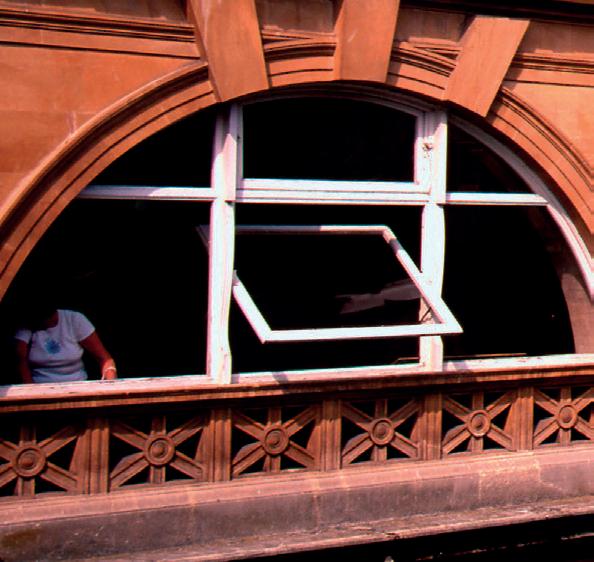









In the evening, we went to the Roman Baths. It is the most popular attraction in the city. If you’re tired after a long day, I would definitely recommend relaxing in the thermal waters of Bath Spa. I thought it was wonderful!







Focus Second Edition 2, Unit 4, Student’s Book 54
M04_Focus_SB2_Global_BrE_3888_5kor.indd 54 15.05.2019 12:46



4 2.24 Match the words and phrases in purple in the blog with the definitions below. Then listen, check and repeat.
1 an interesting thing to see or do = 2 choice or range =
3 food that you can only find here = 4 places that were important in the past = 5 something you should definitely see or do =
5 Read the WRITING FOCUS. Complete the examples with the underlined words in the blog in Exercise 2.
WRITING FOCUS
A blog entry
1 Say when and/or why you visited
Last week/weekend/month, etc. I went to …/I visited my cousin/friend/aunt in …
2 Introduce the place
… is a small/large city in … … is a popular tourist destination. … is famous for its …
3 Give impressions or opinions
It is a busy/interesting/1 place.
Most people seem to/2 to …
According to …
I thought it was great/3 /a bit boring.
It (the food) was 4 !
4 Make recommendations
I would (definitely) 5 (doing something). For visitors, … is a must.
6 SPEAKING Complete these sentences to describe your own town or region. Then compare your answers with a partner.
1 is famous for
2 For visitors, is a must.
3 is probably the most popular attraction.
4 One of the local specialities is 5 I would recommend
7 Read the LANGUAGE FOCUS. Complete with examples of comma use in the blog.
LANGUAGE FOCUS
Punctuation – commas
• Put a comma between the names of cities and states or countries – 1Bath, Somerset
• Use commas to separate three or more nouns in a list –2
• Use commas to separate clauses in a sentence when they are joined by but or so –3
• Use a comma to separate an if-clause from the main clause when the if-clause is the first one in a sentence – 4
• Use a comma after time expressions at the beginning of a sentence – 5
8 Add commas to the text about the Lake District.
The Lake District
The Lake District Cumbria is the UK’s most popular national park. Every year 15 million people visit the area. The landscape is wonderful – there are lakes mountains beaches and breathtaking views. The Lake District is the wettest place in England but the dramatic skies are part of the attraction. Lake Windermere is eleven miles long and is a must for all visitors. If you enjoy walking hiking climbing or water sports the Lake District is an ideal place for a holiday.









SHOW WHAT YOU‘VE LEARNT
9 Do the writing task. Use the ideas in the WRITING FOCUS and the LANGUAGE FOCUS to help you.
Write a blog entry in which you describe your impressions after visiting a well-known tourist destination. Include the following information:
• introduce the place and write when you were there
• write what you did there and what you saw
• present your impressions and your opinion about this place
• give some advice to the readers.
A few months ago, I visited …
12:46
55
M04_Focus_SB2_Global_BrE_3888_5kor.indd 55 15.05.2019 12:46









4.8



SPEAKING
Making suggestions
4 2.26 Complete each expression in the dialogue with an appropriate word from the SPEAKING FOCUS. Then listen and check.



I can make suggestions and respond to them politely.
1 SPEAKING Imagine you are visiting London. Discuss which of these activities you would like to do. Give reasons for your answers.
SIX OF THE BEST THINGS TO DO IN LONDON
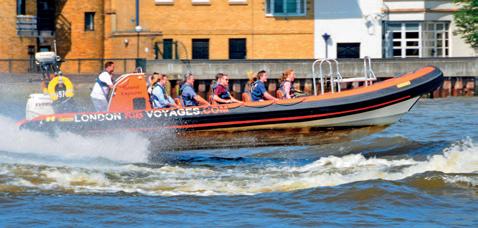
Shopping
London by speedboat
7 days a week, all year
Suitable for all ages!
£35 for 50 minutes
Oxford Street shops: 8.30 a.m.– 9 p.m., Sun 11.30 a.m.– 6 p.m.
Camden Market: Clothes, music, souvenirs.
10 a.m.– 6 p.m. daily

The London Dungeon
Prepare to be scared!
tours from £20


The London Eye


Get the best view of London.
10 a.m.– 9 p.m. every day
Adult: £19, 15 and under: £10
10 a.m.–4 p.m. on Mon, Tue, Wed, Fri,

10 a.m.–5 p.m. on Sun, 10 a.m.–6 p.m. on Sat, 11 a.m.–4 p.m. on Thur

Madame Tussauds
A: Do you fancy 1 to the cinema tonight?
B: That’s a good 2 ! What do you want to see?
A: The new film with Jennifer Aniston.
B: Oh no, I’m not 3 on romantic comedy. I’d 4 see an action film.
A: Okay, let’s see the new James Bond
5
B: Great. How 6 having a burger before we go?
A: Why 7 ! We 8 try that new burger bar in town.
5 SPEAKING You are planning a day out in Edinburgh. Look at the tourist information. Follow the instructions below to prepare a dialogue. Use the SPEAKING FOCUS to help you.
A: Suggest an activity for the morning.
B: Agree and suggest something for the afternoon.
A: Disagree and suggest something different for the afternoon.
B: Disagree and suggest something else for the afternoon.
A: Agree and suggest something for the evening.
B: Agree.
National Museum of Scotland
10 a.m.–5 p.m.
Shakespeare’s Globe Theatre Experience Romeo and Juliet in Shakespeare’s own theatre! Tickets: £20–£45
Standing tickets from £5 only
Come and see the Royal Family!
9 a.m.– 6 p.m. daily
Adult: £30 – save 50% when you book online

2 2.25 Listen to Marcus and Ann. What do they decide to do? Which activities do they reject and why?
3 2.25 Listen again and tick the expressions you hear.
SPEAKING FOCUS
Making suggestions
Do you fancy (going) …?
Let’s (go) …
How about (going) …?
We could (go)…
(I think) we should (go) …
What about (going) …?
Why don’t we (go) …?
Agreeing with suggestions (That’s a) good/great idea! (That) sounds good/great! Why not!
Disagreeing with suggestions
(I ‘m sorry) I’m not keen on … I don’t really like … I’d rather (go) … I’m not sure about that. Let’s (go) … instead.
Botanic Gardens
10 a.m.–6 p.m.
Climb a hill to get great views of the city
2 hours to climb up
Visit Edinburgh Castle
9.30 a.m.–5 p.m.
Comedy at ‘Comedy Club’
8.30 p.m.–midnight
Ghost tour ‘Dark secrets of old Edinburgh’ 3 p.m.
Learn to do Scottish dancing
7 p.m.–midnight
Eat seafood in waterfront restaurants 7 p.m.–midnight











6 SPEAKING Practise your dialogue. Then act it out to the class.
ROLE-PLAY Video 3
11 Watch the video and practise. Then role-play your dialogue.
Focus Second Edition 2, Unit 4, Student’s Book
56
M04_Focus_SB2_Global_BrE_3888_5kor.indd 56 15.05.2019 12:46

UNIT 4 Home sweet home Word list
4.1 Vocabulary 4.25
accommodation /əˌkɒməˈdeɪʃən/ basement /ˈbeɪsmənt/ bedside table /ˌbedsaɪd ˈteɪbəl/ block of flats /ˌblɒk əv ˈflæts/ bookcase /ˈbʊk-keɪs/ brick /brɪk/ bungalow /ˈbʌŋɡələʊ/ carpet /ˈkɑːpət/ dywan chest of drawers /ˌtʃest əv ˈdrɔːz/ comfortable /ˈkʌmftəbəl/ wygodny concrete /ˈkɒŋkriːt/ cooker /ˈkʊkə/ cosy /ˈkəʊzi/ przytulny cottage /ˈkɒtɪdʒ/ cupboard /ˈkʌbəd/ desk /desk/ detached house /dɪˌtætʃt ˈhaʊs/ do the cooking /ˌduː ðə ˈkʊkɪŋ/ do the gardening /ˌduː ðə ˈɡɑːdnɪŋ/ do the housework /ˌdu ðə ˈhaʊswɜːk/ do the ironing /ˌduː ði ˈaɪənɪŋ/ do the shopping /ˌduː ðə ˈʃɒpɪŋ/ do the washing /ˌduː ðə ˈwɒʃɪŋ/ do the washing-up /ˌduː ðə ˌwɒʃɪŋ ˈʌp/ do your homework /ˌduː jɔː ˈhəʊmwɜːk/ downstairs /ˌdaʊnˈsteəz/ fridge /frɪdʒ/ front door /ˌfrʌnt ˈdɔː/ glass /ɡlɑːs/ in a village /ˌɪn ə ˈvɪlɪdʒ/ in the city centre /ˌɪn ðə ˌsɪti ˈsentə/ in the countryside /ˌɪn ðə ˈkʌntrisaɪd/ in the suburbs /ˌɪn ðə ˈsʌbɜːbz/ interior wall /ɪnˌtɪəriə ˈwɔːl/ kitchen sink /ˌkɪtʃən ˈsɪŋk/ ladder /ˈlædə/ make a complaint /ˌmeɪk ə kəmˈpleɪnt/ make a decision /ˌmeɪk ə dɪˈsɪʒən/ make a mess /ˌmeɪk ə ˈmes/ make a noise /ˌmeɪk ə ˈnɔɪz/ make dinner /ˌmeɪk ˈdɪnə/ make your bed /ˌmeɪk jɔː ˈbed/ metal /ˈmetl/ modern /ˈmɒdn/ narrow /ˈnærəʊ/ natural light /ˌnætʃərəl ˈlaɪt/ near the sea /ˌnɪə ðə ˈsiː/ neighbour /ˈneɪbə/ on a housing estate /ˌɒn ə ˈhaʊzɪŋ ɪˌsteɪt/ on the edge of the city /ˌɒn ði ˈedʒ əv ðə ˈsɪti/ on the first floor /ɒn ðə ˌfɜːst ˈflɔː/ on the ground floor /ɒn ðə ˌɡraʊnd ˈflɔː/ on the second floor /ɒn ðə ˌsekənd ˈflɔː/ on the top floor /ɒn ðə ˌtɒp ˈflɔː/ open-plan /ˌəʊpən ˈplæn/ radiator /ˈreɪdieɪtə/ semi-detached house /ˌsemidɪˌtætʃt ˈhaʊs/ shelf /ʃelf/ spacious /ˈspeɪʃəs/
stairs /steəz/ stone /stəʊn/ terraced house /ˌterəst ˈhaʊs/ traditional /trəˈdɪʃənəl/ upstairs /ˌʌpˈsteəz/ wardrobe /ˈwɔːdrəʊb/ wide /waɪd/ wood /wʊd/ wooden floor /ˌwʊdn ˈflɔː/
4.2 Grammar 4.26
community /kəˈmjuːnəti/ couch /kaʊtʃ/ feel at home /ˌfiːl ət ˈhəʊm/ feel homesick /ˌfiːl ˈhəʊmˌsɪk/ free /friː/ host /həʊst/ houseboat /ˈhaʊsbəʊt/ luxury /ˈlʌkʃəri/ member /ˈmembə/ neighbourhood /ˈneɪbəhʊd/ studio apartment /ˈstjuːdiəʊ əˌpɑːtmənt/
4.3 Listening 4.27
come round /ˌkʌm ˈraʊnd/ get away from /ˌɡet əˌweɪ ˈfrəm/ keep sb out /ˌkiːp ˌsʌmbədi ˈaʊt/ lamp /læmp/ let sb in /ˌlet ˌsʌmbədi ˈɪn/ shell /ʃel/ show sb around /ˌʃəʊ ˌsʌmbədi əˈraʊnd/ souvenir /ˌsuːvəˈnɪə/ stay in /ˌsteɪ ˈɪn/
4.4 Reading 4.28
abandon /əˈbændən/ ancient /ˈeɪnʃənt/ attract /əˈtrækt/ breathtaking view /ˌbreθteɪkɪŋ ˈvjuː/ busy /ˈbɪzi/ camel /ˈkæməl/ cave /keɪv/ crater /ˈkreɪtə/ dense /dens/ desert /ˈdezət/ develop underwater vision /dɪˈveləp ˌʌndəˈwɔːtə ˈvɪʒən/ dry /draɪ/ electricity /ɪˌlekˈtrɪsəti/ historic monument /hɪˌstɒrɪk ˈmɒnjəmənt/ hot springs /ˌhɒt ˈsprɪŋz/ humid /ˈhjuːmɪd/ impressive /ɪmˈpresɪv/ island /ˈaɪlənd/ landscape /ˈlændskeɪp/ lush /lʌʃ/ mining /ˈmaɪnɪŋ/ mountain /ˈmaʊntən/ move (house) /ˌmuːv (ˈhaʊs)/ nomadic tribe /nəʊˌmædɪk ˈtraɪb/ population /ˌpɒpjəˈleɪʃən/ rainforest /ˈreɪnfɒrəst/ rock /rɒk/ ruins /ˈruːənz/ scorching /ˈskɔːtʃɪŋ/
stilt /stɪlt/ tourist destination /ˈtʊərəst destəˌneɪʃən/ trading centre /ˈtreɪdɪŋ ˌsentə/ traffic jam /ˈtræfɪk ˌdʒæm/ treehouse /ˈtriː haʊs/ turquoise ocean /ˌtɜːkwɔɪz ˈəʊʃən/ vegetation /ˌvedʒɪˈteɪʃən/ volcanic /vɒlˈkænɪk/ volcano /vɒlˈkeɪnəʊ/
4.5 Grammar 4.29 ceiling /ˈsiːlɪŋ/ house-warming party /ˈhaʊswɔːmɪŋ ˌpɑːti/ sheet /ʃiːt/ warn /wɔːn/ dress up as /ˌdres ˈʌp əz/
4.6 Use of English 4.30 a little/a bit/slightly /ə ˈlɪtl/ə ˈbɪt/ˈslaɪtli/ badly /ˈbædli/ completely /kəmˈpliːtli/ extremely /ɪkˈstriːmli/ luckily /ˈlʌkɪli/ quite/rather/pretty /kwaɪt/ˈrɑːðə/ˈprɪti/ really /ˈrɪəli/ stay up /ˌsteɪ ˈʌp/ unbelievably /ˌʌnbəˈliːvəbli/ well /wel/
4.7 Writing 4.31
a must /ə ˈmʌst/ according to /əˈkɔːdɪŋ tə/ architecture /ˈɑːkətektʃə/ attraction /əˈtrækʃən/ be famous for /bi ˈfeɪməs fə/ delicious /dɪˈlɪʃəs/ entertainment /ˌentəˈteɪnmənt/ historic site /hɪˌstɒrɪk ˈsaɪt/ local speciality /ˌləʊkəl ˌspeʃiˈæləti/ lovely /ˈlʌvli/ nightlife /ˈnaɪtlaɪf/ on foot /ˌɒn ˈfʊt/ recommend /ˌrekəˈmend/ selection of /səˈlekʃən əv/ tend to /ˈtend tə/ tourist highlight /ˌtʊərəst ˈhaɪlaɪt/ wonderful /ˈwʌndəfəl/ 4.8 Speaking 4.32
adult /ˈædʌlt/ castle /ˈkɑːsəl/ daily /ˈdeɪli/ hill /hɪl/ river /ˈrɪvə/ royal family /ˌrɔɪəl ˈfæməli/ suitable /ˈsuːtəbəl/ waterfront restaurant /ˌwɔːtəfrʌnt ˈrestərɒnt/
12:46 57
M04_Focus_SB2_Global_BrE_3888_5kor.indd 57 15.05.2019 12:46

FOCUS REVIEW 4
VOCABULARY AND GRAMMAR USE OF ENGLISH
1 Complete the sentences with the words in the box. There are two extra words.
bungalow centre cupboard drawers suburbs temperatures vegetation
1 There is a new housing estate in the of the city. You can get there by bus.
2 Last month my family moved to a modern with a large garden.
3 This chest of is too small for my clothes. I need a big wardrobe.
4 Singapore is an important trading in Asia. That’s why the port there is so big.
5 Many popular tourist destinations have scorching in summer.
2 Complete the sentences with the correct form of the words in capitals.
1 The Eiffel Tower is probably the most popular tourist in Paris. ATTRACT
2 This is a costume worn by young men on special occasions. TRADITION
3 My room in the new house is much more than in the old flat. SPACE
4 The room was cosy with stairs leading up to the next floor. WOOD
5 Our neighbours play loud music nearly every night. We’ve made several COMPLAIN
3 Complete the second sentence using the word in capitals so that it has a similar meaning to the first. Do not change the word in capitals.
1 They moved to Venice in 2016. LIVED They 2016.
2 Liz started working for a coachsurfing service two years ago. WORKED
Liz for a couchsurfing service for two years.
3 They last saw Paul in January. SINCE They January.
4 When did you first meet Karen? KNOWN How long Karen?
5 I stopped travelling abroad three years ago. FOR I three years.
4 Complete the sentences with the correct future forms of the verbs in brackets.
1 Are you moving house on Saturday? I you if you like. (help)
2 I’m sorry I can’t come. I a language course this evening. (start)
3 We on Friday night, but we still don’t know where exactly. (meet)
4 Hi, Jack! It’s Sue. What time you tomorrow? (come)
5 ‘Was that the doorbell?’ ‘Yes, I it!’ (answer)
6 I probably in tonight. I feel so tired. (stay)
5 Choose the correct answer, A, B or C.
1 X: What are your neighbours like?
Y: We haven’t got any close neighbours. We live in a house in the countryside.
A terraced
B detached
C semi-detached
2 X: Do you fancy going to the cinema?
Y: I’m not sure about that. go swimming.
A How about
B Let’s
C I would recommend
3 X: How long have you lived here?
Y: Not very long.
A For a few weeks.
B Since I was born.
C A few weeks ago.
4 X: Is Tamara going to the party?
Y: No, she isn’t dancing and is a bit shy.
A rather
B like
C keen on
5 X: Has your uncle seen your new house?
Y: I don’t think so.
A I’ll keep him out.
B I won’t let him in.
C He's coming round tomorrow.
6 X: Do most people you know tend to eat ?
Y: Yes, they try to avoid fast food.
A healthy
B healthily
C unhealthily
6 Choose the correct answer, A, B or C, to complete both sentences.
1 I’ll dinner. What would you like?
Can you tidy your room, please, and your bed?
A do B make C prepare
2 What ancient would you like to visit?
Do you fancy walking around in the centre?
A city B monument C trading
3 There are a lot of places to the shopping in my town.
It’s best to the washing-up right after the meal.
A do B go C make
4 I’d take a taxi to the suburbs.
Put on a coat – it’s cold outside.
A quite B like C rather
5 We were surprised when we heard the news. There was table next to the sofa.
A a little B slightly C so
6 The shops aren’t on Sunday afternoons. We used to live in a(n) -plan flat.
A working B closed C open
Focus Second Edition 2, Unit 4, Student’s Book 58
M04_Focus_SB2_Global_BrE_3888_5kor.indd 58 15.05.2019 12:46
LISTENING
7 2.27 Listen to four people talking about living in the suburbs. Match the speakers (1–4) with the statements (A–E). There is one extra statement. Listen to the recording twice.
The speaker:
A feels a member of the community in the suburbs.
B has changed his/her opinion about living in the suburbs.
C is not going to live in the suburbs all his/her life.
D addresses people who don’t want to live in the city centre.
E presents people’s opinions about living in the suburbs.
SPEAKING
8 Your family and you are going to spend a month of your summer holiday somewhere in England. You are looking through different types of accommodation available. In pairs, discuss which accommodation you would prefer for a month-long holiday and why.
Think about:
• location
• surroundings
• attractions
• price





9 In pairs, describe the photo and answer the questions.
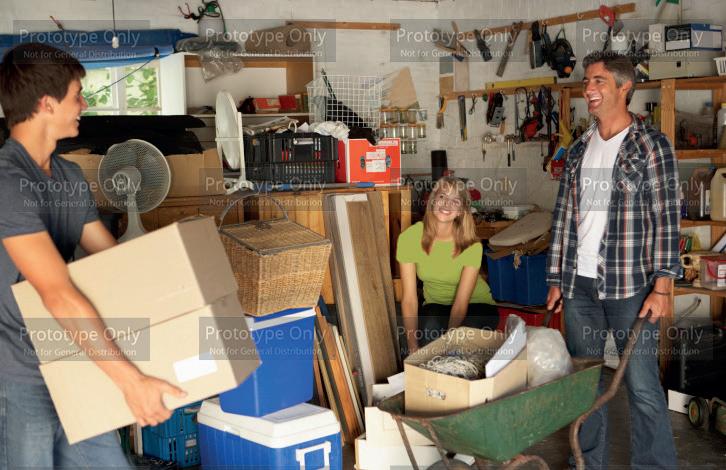
1 What are the family doing, in your opinion?
2 How do you help with the housework in your home?
3 Tell us about a situation when you or someone you know had to tidy up a garage or basement.
WRITING
10 Read the writing task. Decide in what order the sentences (a–d) should be used in the blog post.
You’ve recently been on a school trip to one of the cities in your country. Share your impressions of this city in a blog post. Include the following information:
• say what city you visited and when
• express and explain your opinion about this city
• write what you recommend seeing in the city you visited
• describe an unexpected problem you had on the trip and how it was solved.
a Lyon is a beautiful, historic city.
b Unfortunately, we missed our train back to Paris.
c I would recommend visiting Parc de la Tête d’Or.
d Last month we went on a class trip to Lyon.
11 Write the blog post.
12:46 59
M04_Focus_SB2_Global_BrE_3888_5kor.indd 59 15.05.2019 12:46

GRAMMAR AND USE OF ENGLISH

AND USE OF ENGLISH

1.3 Tense and aspect
3.6 too and not enough
Tense refers to the time when an action or event takes place: present, past and future.
We use too and (not) enough to make comparisons and talk about a degree of a quality. Too means ‘more than you need or want’. Enough means ‘the amount you need’. Not enough means ‘less than you need or want’.
We use too:
• before adjectives:
Aspect refers to how we regard the duration of the action or event being described – whether it is in progress or complete. We have two aspects: the continuous (also known as ‘progressive’) and the perfect (also known as ‘perfective’). There is no simple aspect. Each tense (or time) can be expressed in the continuous and the perfect aspect. The tense forms in each different aspect share common characteristics.
The painting is too dark and I can’t see what’s in it.
Too has a negative meaning when used in an affirmative sentence. When used with negation, it has a positive meaning:
Continuous aspect
The plot is too complex – I can’t understand it.
The plot isn’t too complex – it’s easy to follow it.
Present Continuous/Past Continuous/Future Continuous
• with nouns, in expressions too many/much:
The continuous aspect shows that actions or events are in progress during a particular period of time. The actions are temporary and/or of limited duration and occur in present time, past time or future time. The actions are not necessarily completed.
There are too many horror films at the cinema these days.
The artist didn’t give too much advice to the kids so they painted how they liked.
We use (not) enough:
• after adjectives:
Perfect aspect
Present Perfect/Past Perfect/Future Perfect
The special effects weren’t realistic enough so the film wasn’t very popular.
• before nouns:
The perfect aspect creates a link between two time periods. It shows:
I think there are enough cooking programmes on TV nowadays.
• the connection between an action happening in one time and an action happening in another time.
• the connection between an action happening in one time and another point in time.
Enough has a positive meaning when used in an affirmative sentence. When used with negation, it has a negative meaning:
We had enough photos to prepare the exhibition. We didn’t have enough photos to prepare the exhibition.
The continuous and perfect aspects combine to show that an action has been, was or will be in progress before a point in time. (Present Perfect Continuous, Past Perfect Continuous and Future Perfect Continuous).
1 Complete the sentences with too or enough and the adjectives in the box.
Simple tense forms
Present Simple and Past Simple
chilly dishonest embarrassing generous imaginative outgoing
These tenses perform similar functions when referring to present time (Present Simple) and past time (Past Simple). Both these tenses are used to talk about:
1 I think Angela is to trust with the money for our concert tickets.
• routines and habits.
2 Do you think Adam is to write a fantasy novel?
3 Sarah isn’t to take part in a live TV show.
Present Simple: They walk to college every day.
Past Simple: They walked to college every day.
4 It’s much to go painting outside, so we’ll stay in the art studio today.
• states and permanent situations.
Present Simple: He feels angry.
5 John thinks it’s to walk through the streets in his Batman costume.
Past Simple: He felt angry.
Present Simple: They live in the USA.
6 Do you think the company is to buy us new cameras?
Past Simple: They lived in the USA.
NB
The Present Simple is always used when we refer to general truths. The Earth travels round the Sun.
Future forms
The Future is not expressed by a single tense. Depending on what exactly we want to express about the future we can use:
• the Present Continuous (for agreed arrangements). I’m seeing Jo and Tony at the café later.
• going to + verb (for intentions and predictions for which there is present evidence).
2 Complete the dialogues with too or enough and the word(s) in brackets.
1 A: Are you going to watch the new Star Wars film at the cinema?
He says he’s going to travel for a year before going to university.
Look at their expressions! It’s obvious they’re not going to be friends!
B: The tickets are , so I’ll wait for the DVD. (expensive)
2 A: Why was the exhibition cancelled?
• will + verb (for future facts, sudden decisions and general predictions).
B: In the end, there weren’t (paintings)
He’ll be eighteen next year.
OK. I’ll tell him!
3 A: Do you still want to learn how to play the guitar?
I’m sure they’ll get on with each other in the end. Just give them time!
B: No. I think there are , so I’ll learn the drums. (guitar players)
• the Present Simple (for timetabled events; after certain time adverbials when describing a future event).
4 A: Do you want to watch this new science fiction series?
B: No. TV series are and a waste of time. (addictive)
The party starts at eight.
5 A: This thriller isn’t very good, is it?
I’ll call you as soon as they arrive.
Continuous tense forms
B: Yes, it isn’t to continue watching. (gripping)
6 A: I don’t know what’s happening in this period drama.
The Present Continuous, Past Continuous and Future Continuous
B: Yeah, the plot is much to understand. (complex)
The continuous forms are used to talk about:
• Actions in progress at the time of speaking in the present (NOT repeated actions).
3 Choose the answer, A, B or C, that is closest in meaning to the words in bold.
1 I think the concert won’t be too popular
Present Continuous: I’m watching the film right now.
A a lot of people will go to the concert
• Actions in progress at a particular time in the past.
B not many people will go to the concert
C nobody will go to the concert
• Actions in progress in the future.
NB
Past Continuous: I was watching the film then.
2 There shouldn’t be more game shows on TV.
A are enough
Future Continuous: This time tomorrow I’ll be flying to Paris!
B aren’t enough
• Temporary actions or situations.
C aren’t many
3 I think there should be more art in public spaces.
A there is enough
Present Continuous: He’s working for his dad for the time being.
Past Continuous: He was working for his dad when I met him. Future Continuous: He’ll be working for his dad for a while.
B there isn’t enough
C there is too much
4 At the end of this film, the bad character shows his support for the hero.
A takes on
B gives up
C stands up for
Stative and dynamic verbs
The Present and Past Continuous tenses can be used with repeated actions and an adverb of frequency to show annoyance at the repeated action. He is/was always forgetting to lock the door!
5 This sculpture is smaller than I thought it would be.
A as big as
B as small as
C not as big as
Verbs expressing emotions (e.g. hate, like, love), states of mind (e.g. believe, know, need, prefer, remember, seem, think, understand, want) or senses (e.g. feel, hear, see) are called stative or state verbs and are not usually used in any continuous tense (unlike dynamic or action verbs).
6 I love books with creative plots set in famous periods in the past
A fantasy novels
B historical fiction books
• think
C biographies
Some verbs can be both stative and dynamic, for example:
I think you’re wrong. (= believe, have an opinion – stative verb)
I’m thinking about the situation. (= consider, be involved in the process of thought – dynamic verb)
• have
She has three dogs. (= own, possess – stative verb) She’s having lunch now. (= eat – dynamic verb)



Focus Second Edition 2, Unit 4, Student’s Book 140
140
GRAMMAR
Z02_Focus_SB2_Global_BrE_3888_Grammar_5kor.indd 140 15.05.2019 14:41



• see


4.2 Present Perfect with for and since
I see what you mean. (= understand – stative verb)
I’m seeing the director tomorrow. (= meet – dynamic verb)
• be
Tom is a very critical person. (= permanent quality – stative verb)
We use the Present Perfect to talk about states and actions that started in the past and still continue. We often use the words since and for when we use the Present Perfect in this way.
• Since refers to a moment or point in time when the activity started:
Tom is being very critical of everything today. (temporary behaviour – dynamic verb)
since 2000 / Monday / last summer / my birthday / I was born
We sometimes use stative verbs in continuous forms while talking about things/events which last for a short period of time.
I like my job a lot. (= permanent state – simple form)
• For refers to a time period between a time in the past and now:
How are you liking your new job? (= short time – continuous form)
for five minutes / two weeks / a long time / ages
I love rock concerts. (= permanent state – simple form)
Notice the example sentences:
I’m loving this concert. (= short time – continuous form)
My parents have had this house since 1990
I have known Carol for ten years.
Some stative verbs can be used in continuous forms only in certain tenses. For example, need, want and mean can have future or present perfect progressive uses.
Will you be needing your laptop tomorrow?
Questions about duration are formed using How long ...? How long have you lived in this house?
He’s been wanting a new phone for a while now.
I’ve been meaning to tell you about it since Monday.
Perfect tense forms
1 Look at today’s date and time and complete the table with the correct time expressions. since for
The perfect forms are used to link one time to another time:
Past ➝ Present
1 since December =
Past Past
2 since Saturday =
Present ➝ Future
3 = for 45 minutes
The Present Perfect, Past Perfect and Future Perfect
4 since breakfast =
5 = for 27 years
The Present Perfect is used to link an action in the past to the present time, or to refer to the present result of that past action. We haven’t finished the book yet. (We started it in the past and we’re still reading it.)
6 = for five weeks
7 since I started school =
I’ve lost my keys (past action) so I can’t get into the house. (present result)
The Past Perfect is used to link an action in the past to a previous action in the past.
2 Write questions with How long …? Then write two answers to each question with since and for 1 you / live in your house or flat?
They had left by the time we arrived. (We arrived. Previous to our arrival, they left.)
2 you / know your best friend?
The Future Perfect is used to link a present situation to an action that will be completed in the future.
Let’s start now and we’ll have finished by next Tuesday.
Perfect Simple forms also indicate:
3 you / be at this school?
• that an action is complete.
Present Perfect: They have already said that.
Past Perfect: They had already told them.
Future Perfect: They will have done that before we arrive.
4 you / have a mobile phone?
• that an action is repeated.
Present Perfect: I have told you not to do that at least five times!
Past Perfect: It was only after we had phoned several times that someone answered.
Future Perfect: My granddad will have told Mum and Dad the story at least five times by the time we get there.
• that a situation may be regarded as permanent.
Present Perfect: Fran and Doug have lived in a small town since they married.
REFERENCE AND PRACTICE


3 Complete the sentences with the Present Perfect form
of the verbs in brackets. Then choose for or since
1 We (live) in this house for / since 2005.
Past Perfect: People had become so dependent on computer friendships that they found it difficult to relate to each other on a face-to-face basis.
2 I (not/see) Rob for / since my birthday six weeks ago.
Future Perfect: By the end of next year we will have lived here for ten years.
3 Birgit (work) in Paris for / since ages.
Perfect continuous forms
4 We (not/visit) grandma for / since last winter.
The Present Perfect Continuous, Past Perfect Continuous,
Future Perfect Continuous
5 It looks like you (not/clean) this kitchen for / since several weeks.
Perfect continuous forms link one time to another in the same way as the simple forms.
6 My family (stay) in this holiday villa in Spain every year for / since I was born.
We choose to use a perfect continuous form if we want to emphasise that a situation/action is temporary/in progress at a particular period of time.
7 John and Magda (not/speak) to each other for / since five days.
8 Karen (not/be) near the sea for / since a long time.
Present Perfect Continuous: They’ve been playing computer games all day today! Tell them to stop.
4 Correct the mistakes.
1 How long has Marta and Ania owned this cottage?
Past Perfect Continuous: I had been waiting for two hours before he finally arrived!
2 I have lived in the suburbs since three weeks.
3 I love the countryside. How long you have been here?
Future Perfect Continuous: They’ll have been sitting there and chatting all morning by the time I get there.
4 Charlie, have you did the ironing?
NB
5 Bob, look! Monica has came round to visit us.
6 I haven’t spent Christmas with my family for 2015.
Since the emphasis is on the duration of the activity we do not specify how many times an action happened.
7 I have known her from ten years.
I’ve been trying to write my blog all day. NOT I’ve been trying to write my blog three times.
8 Sarah hasn’t got any money left because she has buy a new flat.
5 Complete the second sentence so that it means the same as the first. Use no more than five words including the word in capitals.
1 Complete the sentences with the correct forms of the verbs in brackets. Use any other words provided.
1 As children (grow up) they tend to lose their dependence on their parents.
1 We moved to Ankara two years ago. FOR We two years.
2 Jack (always/fall out) with us over petty things. It’s so annoying!
2 I last saw Mark in February. SINCE I February.
3 Supporting friends while they (have) a run of bad luck is part of what friendship is.
3 Annette bought the cooker last week. HAD Annette last week.
4 Before we got our pet dog we (not realise) what a strong bond you can form with an animal.
4 Dad stopped making furniture about five years ago. NOT Dad about 2015.
5 While we (help) Rose pack, her grandmother was collecting some food for her to take with her.
5 I met my neighbour a long time ago. KNOWN I ages.
6 Complete the text with the correct form of the verbs in the box. There are two extra gaps. Use for or since in the extra gaps.
6 At that time people (live) in small communities and everyone knew each other.
7 Don’t worry, by the time you get back, we (solve) the problem.
invite make move plan promise show
8 Mick’s irreverent attitude meant he (laugh) at people in authority for years.
9 I grew up with the kids in the neighbourhood; by the time I leave for university next year I (hang out) with them for nearly sixteen years!
10 I’m so excited! The plane lands at five p.m. and all my friends (wait) at the airport to welcome me back home!
I’m really happy because my family has just 1 near the sea. In fact, we’ve lived here 2 one month. Of course, I was sad to leave my friends back in Manchester, but I’ve 3 them to stay with me next summer and I’ve 4 to write to them often.
11 When I reached the ship’s rails the dolphins (already/disappear). I was so disappointed!
I’ve been at my new school 5 last Monday and I have already 6 some new friends. They’re really nice and have 7 me the best places to see. I’m sure they’ve 8 something interesting for this weekend too. I think I’m going to really enjoy living here.
14:41 141
141
?
?
?
? Z02_Focus_SB2_Global_BrE_3888_Grammar_5kor.indd 141 15.05.2019 14:41

GRAMMAR AND USE OF ENGLISH

GRAMMAR AND USE OF ENGLISH

1.3 Tense and aspect
4.5 Future forms: Present Continuous, be going to and will
Tense refers to the time when an action or event takes place: present, past and future.
• We use the Present Continuous for fixed future arrangements, which have already been planned and prepared:
I can’t go shopping tomorrow at five. I’m playing tennis with Joy. (I’ve already made an arrangement with Joy.)
Aspect refers to how we regard the duration of the action or event being described – whether it is in progress or complete. We have two aspects: the continuous (also known as ‘progressive’) and the perfect (also known as ‘perfective’). There is no simple aspect. Each tense (or time) can be expressed in the continuous and the perfect aspect. The tense forms in each different aspect share common characteristics.
• We use be going to + infinitive to talk about future intentions or plans, which may still be changed:
Are you going to invite your aunt to the party?
Continuous aspect
• We use will + infinitive for spontaneous decisions made at the moment of speaking, often in reaction to a new situation. We often use will with:
Present Continuous/Past Continuous/Future Continuous
I think I’ll …, I’ll probably …, Don’t worry, I’ll … I think I’ll ask Luke for help.
Affirmative Negative
The continuous aspect shows that actions or events are in progress during a particular period of time. The actions are temporary and/or of limited duration and occur in present time, past time or future time. The actions are not necessarily completed.
Perfect aspect
I am (’m) going to sleep.
You/We/ They are (’re) You/We/ They are not (aren’t)
I am not (’m not) going to study.
Present Perfect/Past Perfect/Future Perfect
He/She/ It is (’s) He/She/It is not (isn’t)
Yes/No questions Short answers
The perfect aspect creates a link between two time periods. It shows:
Yes, I am No, I am not (’m not)
• the connection between an action happening in one time and an action happening in another time.
Are you/we/ they Yes, you/we/they are No you/we/they are not (aren’t)
Am I going to study?
• the connection between an action happening in one time and another point in time.
Is he/she/ it Yes, he/she/it is No, he/she/it is not (isn’t)
Wh- questions
When
The continuous and perfect aspects combine to show that an action has been, was or will be in progress before a point in time. (Present Perfect Continuous, Past Perfect Continuous and Future Perfect Continuous).
am I going to study? are you/we/ they is he/she/it
Subject questions
Simple tense forms
Who is going to study?
Present Simple and Past Simple
Affirmative Negative
I/You/ He/She/ It/We/ They will drop biology.
• routines and habits.
1 Complete the sentences with the appropriate future forms of the verbs in brackets.
• going to + verb (for intentions and predictions for which there is present evidence).
He says he’s going to travel for a year before going to university.
1 Mum (see) the dentist at four o’clock this afternoon.
2 It’s my birthday next month but I (not have) a party.
I/You/ He/She/ It/We/ They
These tenses perform similar functions when referring to present time (Present Simple) and past time (Past Simple). Both these tenses are used to talk about:
will not (won’t) drop biology.
Yes/No questions Short answers
Present Simple: They walk to college every day.
Past Simple: They walked to college every day.
Look at their expressions! It’s obvious they’re not going to be friends!
• will + verb (for future facts, sudden decisions and general predictions).
3 Brrr, it’s cold in here. I think I (turn) the heating on.
He’ll be eighteen next year.
4 What (you / do) later? Do you want to go for a coffee?
OK. I’ll tell him!
5 My cousin (get married) in May.
I’m sure they’ll get on with each other in the end. Just give them time!
6 Sorry, I can’t talk now. I (call) you back later.
• the Present Simple (for timetabled events; after certain time adverbials when describing a future event).
The party starts at eight.
I’ll call you as soon as they arrive.
7 These bags are so heavy, I (carry) them for you.
2 What will these people say in the following situations? Choose the best option.
Continuous tense forms
The Present Continuous, Past Continuous and Future Continuous
1 A customer at a café: I’ll have / I’m going to have / I’m having a big glass of orange juice, please.
The continuous forms are used to talk about:
• Actions in progress at the time of speaking in the present (NOT repeated actions).
2 Someone who’s just heard about his uncle’s problem: What? Uncle Bob will paint / is going to paint his house all by himself on Saturday? I’m going to help / I’ll help him!
Present Continuous: I’m watching the film right now.
• Actions in progress at a particular time in the past.
Past Continuous: I was watching the film then.
• Actions in progress in the future.
3 A businesswoman talking about her plans for the new year: I’m going to help / I’ll help / I’m helping some African charities this year.
• Temporary actions or situations.
NB
Present Continuous: He’s working for his dad for the time being.
4 Someone talking to his/her friend on the phone: I’m having / I’ll have / I’m going to have a house party on Saturday. I’ve already bought the food and drink but can you bring the music?
Future Continuous: This time tomorrow I’ll be flying to Paris!
Past Continuous: He was working for his dad when I met him.
Future Continuous: He’ll be working for his dad for a while.
5 Someone talking to his/her friend: I’ll buy / I’m going to buy / I’m buying Matt a desk lamp for his birthday. Do you think that’s a good idea?
3 Complete the text with the appropriate future forms of the verbs in brackets.
The Present and Past Continuous tenses can be used with repeated actions and an adverb of frequency to show annoyance at the repeated action. He is/was always forgetting to lock the door!
Next weekend we 1 (have) a school disco in the main hall. I 2 (wear) my favourite shirt with my new jeans and brown shoes.
Stative and dynamic verbs



• states and permanent situations.
Will I/you/ he/she/ it/we/ they
drop biology?
Present Simple: He feels angry.
Yes, I/you/he/she/it/we/they will No, I/you/he/she/it/we/they will not (won’t)
Wh- questions
Past Simple: He felt angry.
Present Simple: They live in the USA.
Past Simple: They lived in the USA.
NB
What will I/you/ he/she/ it/we/ they drop?
Subject questions
Who will drop biology?
The Present Simple is always used when we refer to general truths. The Earth travels round the Sun.
Future forms
The Future is not expressed by a single tense. Depending on what exactly we want to express about the future we can use:
• the Present Continuous (for agreed arrangements). I’m seeing Jo and Tony at the café later.
Verbs expressing emotions (e.g. hate, like, love), states of mind (e.g. believe, know, need, prefer, remember, seem, think, understand, want) or senses (e.g. feel, hear, see) are called stative or state verbs and are not usually used in any continuous tense (unlike dynamic or action verbs).
I 3 (work) in the afternoon in my mum’s shop, but after that I 4 (return) home to have a shower and get dressed. I’m quite excited. But who do I invite? I know! I 5 (ask) Sarah in my Maths class. She’s really nice.
4 Choose the correct option.
Some verbs can be both stative and dynamic, for example:
• think
1 We had a discussion and we’ve decided we are not going to / will not attend the meeting next week.
I think you’re wrong. (= believe, have an opinion – stative verb)
2 Don’t worry. I’ll phone / I’m phoning you to tell you the news.
3 What time are you meeting / will you meet Dr Stevens tomorrow?
I’m thinking about the situation. (= consider, be involved in the process of thought – dynamic verb)
• have
She has three dogs. (= own, possess – stative verb) She’s having lunch now. (= eat – dynamic verb)
4 Who do you think will / is going to win the next World Cup?
Focus Second Edition 2, Unit 4, Student’s Book 142
142
Z02_Focus_SB2_Global_BrE_3888_Grammar_5kor.indd 142 15.05.2019 14:41



4.6 Adverbs
• see


I see what you mean. (= understand – stative verb)
We use adverbs with:
I’m seeing the director tomorrow. (= meet – dynamic verb)
• verbs:
• be
Are you sitting comfortably?
• adjectives:
Tom is a very critical person. (= permanent quality – stative verb)
The living room is really beautiful
• other adverbs:
Tom is being very critical of everything today. (temporary behaviour – dynamic verb)
We sometimes use stative verbs in continuous forms while talking about things/events which last for a short period of time.
I like my job a lot. (= permanent state – simple form)
We drove incredibly slowly because of the traffic jams. Adverbs are usually formed by adding -ly to an adjective (soft – softly).
In other cases:
How are you liking your new job? (= short time – continuous form)
I love rock concerts. (= permanent state – simple form)
I’m loving this concert. (= short time – continuous form)
• for adjectives ending in -le: the -e changes into -y (possible – possibly),
• for adjectives ending in a consonant + -y: -y changes into -i and we add -ly (happy – happily).
Some stative verbs can be used in continuous forms only in certain tenses. For example, need, want and mean can have future or present perfect progressive uses.
Some adverbs take the same form as adjectives: hard – hard, fast – fast, late – late, early – early
Will you be needing your laptop tomorrow?
We use adverbs to define verbs:
He’s been wanting a new phone for a while now.
I’ve been meaning to tell you about it since Monday.
• directly after the verb:
She dances beautifully
Perfect tense forms
The perfect forms are used to link one time to another time:
• after an object, if it is directly after the verb: We ate our breakfast quickly and left for our holidays
Past ➝ Present
Past Past
Present ➝ Future
We form the comparative for most adverbs with more and the superlative with the most: beautifully – more beautifully – the most beautifully.
The Present Perfect, Past Perfect and Future Perfect
Adverbs with the same form as adjectives take the same comparative and superlative forms as the adjectives: low – lower – the lowest.
The Present Perfect is used to link an action in the past to the present time, or to refer to the present result of that past action. We haven’t finished the book yet. (We started it in the past and we’re still reading it.)
Some adverbs take irregular comparative and superlative forms:
• well – better – the best
• badly – worse – the worst
I’ve lost my keys (past action) so I can’t get into the house. (present result)
The Past Perfect is used to link an action in the past to a previous action in the past.
We can use adverbs of degree before both adjectives and adverbs to modify their meaning:
• a little/a bit/slightly:
Sue says that living in the suburbs is slightly better now because there are more shops.
They had left by the time we arrived. (We arrived. Previous to our arrival, they left.)
• quite/rather/pretty:
Since we redecorated the room, it looks pretty good
The Future Perfect is used to link a present situation to an action that will be completed in the future.
• really/extremely/completely:
Let’s start now and we’ll have finished by next Tuesday.
Perfect Simple forms also indicate:
You need to move this chest of drawers extremely carefully because it is an antique.
• that an action is complete.
1 Put the words in the correct order to make sentences.
Present Perfect: They have already said that.
Past Perfect: They had already told them.
1 father / the / my / cleans / rather / house / quickly
Future Perfect: They will have done that before we arrive.
2 you’ve / beautifully / your / decorated / room
• that an action is repeated.
3 pancakes / makes / pretty / good / Janice
4 your / mine / bigger / is / slightly / wardrobe / than
Present Perfect: I have told you not to do that at least five times!
5 the / carefully / door / close / extremely / front
Past Perfect: It was only after we had phoned several times that someone answered.
6 loudly / Laura / the / housework / does / really
Future Perfect: My granddad will have told Mum and Dad the story at least five times by the time we get there.
• that a situation may be regarded as permanent.
Present Perfect: Fran and Doug have lived in a small town since they married.
REFERENCE AND PRACTICE


2 Make adverbs from the adjectives in the box. Then complete the sentences with the correct adverbs. careful easy fast good lucky slow
Past Perfect: People had become so dependent on computer friendships that they found it difficult to relate to each other on a face-to-face basis.
Future Perfect: By the end of next year we will have lived here for ten years.
1 You can have a party in this cosy cottage.
2 How do you play the piano, Bjorn?
Perfect continuous forms
3 Please do the washing-up . I don’t want you to break my expensive plates.
The Present Perfect Continuous, Past Perfect Continuous,
Future Perfect Continuous
4 Never drive in a small village – even when you are in a hurry.
Perfect continuous forms link one time to another in the same way as the simple forms.
5 I love walking through the city centre when I have lots of time.
We choose to use a perfect continuous form if we want to emphasise that a situation/action is temporary/in progress at a particular period of time.
6 I missed the bus, but there was another one in twenty minutes.
3 Choose the correct answer, A, B or C, to complete the text.
Present Perfect Continuous: They’ve been playing computer games all day today! Tell them to stop.
Past Perfect Continuous: I had been waiting for two hours before he finally arrived!
Future Perfect Continuous: They’ll have been sitting there and chatting all morning by the time I get there.
NB
Since the emphasis is on the duration of the activity we do not specify how many times an action happened.
I’ve been trying to write my blog all day. NOT I’ve been trying to write my blog three times.
1 Complete the sentences with the correct forms of the verbs in brackets. Use any other words provided.
1 As children (grow up) they tend to lose their dependence on their parents.
Moving from the city centre and living in the countryside was very strange for me at the beginning. To start with, it is 1 quiet compared to living in the city as there is almost no traffic on the roads. We live in a small village and there aren’t too many terraced or semi-detached houses. There are beautiful, 2 designed stone cottages – most of them with only one or two floors. We live in a bungalow which is 3 spacious. My room, however, is small – but it is very cosy. It’s not very entertaining here – there aren’t many shops or cafés but there are some amazing 4 monuments nearby. I especially like the ruins of the old castle. We walk there sometimes at the weekends and it’s such a fascinating place with lots of gripping stories about it from the past. There are 5 views there too, and this Sunday my family and I 6 a picnic there. I don’t miss life in the city at all!
2 Jack (always/fall out) with us over petty things. It’s so annoying!
1 A a bit
B extremely
4 A history
B historic
3 Supporting friends while they (have) a run of bad luck is part of what friendship is.
C the most
2 A tradition
C historical
5 A lush
4 Before we got our pet dog we (not realise) what a strong bond you can form with an animal.
B traditional
C traditionally
B scorching
C breathtaking
5 While we (help) Rose pack, her grandmother was collecting some food for her to take with her.
3 A pretty
B a little
6 A will have
6 At that time people (live) in small communities and everyone knew each other.
C slightly
B are having
7 Don’t worry, by the time you get back, we (solve) the problem.
C am going to have
8 Mick’s irreverent attitude meant he (laugh) at people in authority for years.
9 I grew up with the kids in the neighbourhood; by the time I leave for university next year I (hang out) with them for nearly sixteen years!
10 I’m so excited! The plane lands at five p.m. and all my friends (wait) at the airport to welcome me back home!
11 When I reached the ship’s rails the dolphins (already/disappear). I was so disappointed!
14:41 143
143
Z02_Focus_SB2_Global_BrE_3888_Grammar_5kor.indd 143 15.05.2019 14:41
UNIT 4 VIDEO WORKSHEETS
Cave houses





BEFORE YOU WATCH
1 Label the photos with the words and phrases in the box. There is one extra word.






WHILE YOU WATCH
3 9 Watch the video and check whether you can hear any of the adjectives in Exercise 2.
4 9 SPEAKING Are sentences 1–5 true (T) or false (F)? Discuss with a partner. Then watch the first part of the video again (00:00 – 02:00) and check your answers.
1 Every evening people visit the incredible landscape in hot air balloons.
2 The rock formations are called fairy chimneys.
3 Humans started living here hundreds of years ago.
4 Rafik owns a local restaurant.
5 His grandparents live in a cave.
5 9 SPEAKING Watch the rest of the video (02:00 – 03:13). Then discuss the questions with a partner.
1 Why do Rafik and his wife live in a house now?
2 Does Rafik miss living in a cave? Why?/Why not?
3 Have you ever seen a landscape like this? Would you like to visit it by hot air balloon?
AFTER YOU WATCH
6 SPEAKING Discuss the questions. Use the KEY PHRASES to express your ideas.
1 Do your parents and grandparents still live in the place where they grew up?
2 Do you think you’ll stay in the place where you grew up or do you think you’ll move away? Why?
KEY PHRASES
I think the advantage / disadvantage of (moving away) is that … One of the good / bad points of (moving away) is that …
Focus Second Edition 2, Unit 4, Student’s Book 122
hot air balloon cave volcanic rock conical rock formations basement
2 SPEAKING Which adjectives in the box are appropriate to describe the landscape? Discuss. Add more adjectives to your list.
1 3 2 4
amazing crowded lonely incredible magical modern prehistoric strange quiet unique
Z01_Focus_SB2_Global_BrE_3888_Videoworksheets_5kor.indd 122 15.05.2019 13:53
Focus Vlog Where people live
Where do people live?
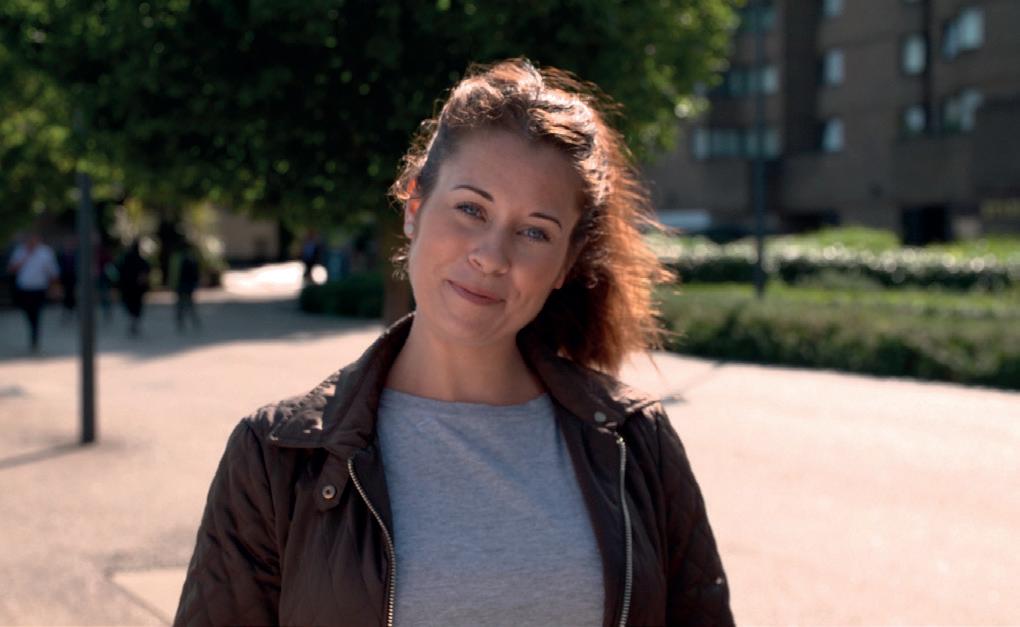

1 Put the words in the box under an appropriate heading.
Type of house Location Inside Outside
bedroom bathroom drive flat gardenkitchen floors/storeys in London opposite a park terraced house
2 10 2.11 Watch and listen to the interviews where people talk about the places they live. Complete the sentences with the names of the speakers.
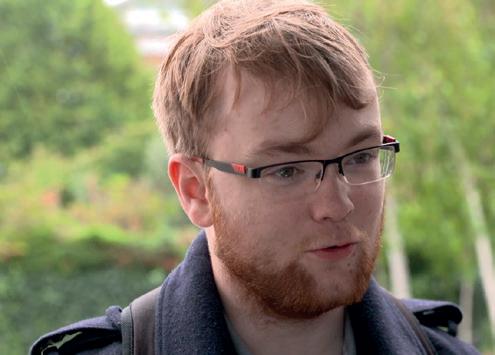



1 lives in a house which is opposite a park.
2 lives in a small house in London.
3 shares his house with other university students.
4 has chickens in the garden.
5 lives in a 4-bedroom flat.
6 has a house full of colours.
7 has a house with a garden.

3 2 1.8 Watch the video again. How long have they lived there?
Oliver Esme
Amber Millie
4 SPEAKING What do you like about your house or flat? How long have you lived there? Tell your partner.
FOCUS ON LIFE SKILLS
Critical thinking – Teamwork – Communication
5 Would you consider living in a different house from the one you are living in now? In groups, discuss which are the most important things to consider when renting or buying a house.
• location (in the centre or in the suburbs)
• type of house (a detached house, a flat etc.)
• price
• neighbourhood
• age (old/modern)
• pets (allowed/not allowed)
• size (number of rooms)
• distance (from school and other important places, e.g. the railway station, the hospital etc.)
• garden
• garage
6 In pairs, decide on the top three things to consider when looking for a house. Present your opinion to the class.

4.2 GRAMMAR
13:53 123
Esme
Oliver
Millie
Amber
Z01_Focus_SB2_Global_BrE_3888_Videoworksheets_5kor.indd 123 15.05.2019 13:53
WORD PRACTICE 2

The arts, Home sweet home
For questions 1–30, choose the correct answer, A, B or C, to complete the sentences.
1 Mrs Jennings lives in a tiny with just one room and a small bathroom.
A block of flats
B studio apartment
C detached house
2 Every needs a lot of different brushes and paints.
A painter B sculptor C photographer
3 During this course you will learn some basic techniques of oil
A painting B sculpture C photography
4 The main subject of his work is the English countryside – he’s a famous ___ painter.
A portrait B abstract C landscape
5 Mark enjoys watching shows, where people answer questions and win prizes.
A chat B game C talent
6 Where can I buy the of the film? I want to listen to it at home.
A story B soundtrack C setting
7 She has already refused to play the of a police officer.
A role B plot C dialogue
8 This horror film is really – you never know what will happen next!
A embarrassing B gripping
C addictive
9 My grandmother is writing her . She wants to tell everyone the story of her life.
A genre B biography C autobiography
10 The latest Spike Lee’s film is a real – it’s already made a lot of money.
A blockbuster B trailer C genre
11 The events described in this book place in Scotland.
A see B take C are
12 How can you watch ? They’ve got a hundred thousand episodes!
A science fiction
B soap operas
C weather forecasts
13 I love listening to music – it’s so much better than the one on MP3s.
A factual B life C live
14 Their new song is number one in the music
A charts B awards C festival
15 I’m going to watch a new of my favourite comedy series tonight.
A article B sitcom C episode
16 Mary has got a small in the forest.
A flat
B bungalow
C cottage
17 There are other houses joined on either side of a house.
A terraced B detached C semi-detached
18 This apartment must cost a lot. It’s right in the , next to the market square.
A suburbs B city centre C countryside
19 I don’t like working in offices. There are no walls and you can hear everything.
A spacious B open-plan C impressive
20 The windows are big, so the house has got lots of natural
A light B view C attraction
21 It’s cold inside because the don’t work.
A cookers B fridges C radiators
22 There’s too little space in my – I have no place to put all my dresses and skirts!
A shelves B cupboard C wardrobe
23 We need to put a new on the floor in the living room.
A carpet B ceiling C cupboard
24 She got to the top of the and looked back at the people below.
A stairs B ceiling C floor
25 This conference centre looks very – it’s a giant constuction made of metal and glass.
A suitable B modern C ancient
26 Will, could you come ? I’m in the basement and I need your help.
A downstairs B upstairs C the stairs
27 Who the ironing in your family?
A has B does C makes
28 I’d like to make a about this phone. I bought it here last week, but it doesn’t work.
A noise B decision C complaint
29 It’s difficult to drive here because the streets are very .
A cosy B narrow C dense
30 We’re planning to visit the of the ancient city of Pompeii.
A pavements B ruins C slums
Focus Second Edition 2, Unit 4, Student’s Book
8
FOCUS2_WORDSTORE_5kor.indd 8 15.05.2019 14:33
WORD STORE 4 Home sweet home
WORD STORE 4A | Describing houses Type
1

1
4
5
6
4
WORD STORE 4D | Phrasal verbs
3
WORD STORE 4B | Inside a house
1
14:33
9
house
of
bungalow
a
cottage
2 a
detached house Location
3 a
in the suburbs
a village
near the sea
in a building
downstairs
in the basement
2 in
3
Location
1
2
on the first floor
materials
stone
wood 3 b Description
traditional 2 m
s
Building
1
2
1
3
a semi-detached house
a terraced house
a block of flats
in the countryside
on a housing estate 6
on the top floor 5 on 6 4 c 5 m 6 g 4 o 5 c 6 h
5
4
bedside tables = 2 bookcases =
carpets =
a chest of drawers
a cooker
6 cupboards =
a desk =
a fridge =
a front door = 10 a kitchen sink = 11 a ladder = 12 radiators = 13 shelves = 14 stairs = 15 a wardrobe = 16 wooden floors =
3
4
= 5
=
7
8
9
away in out round
come round = visit sb in their house 2 get from sth = move away from sth 3 keep sb = stop sb entering a place 4 let sb = allow sb to enter 5 stay = stay at home, not go out
Collocations ancient dense hot lush nomadic scorching volcanic 1 city 2 crater 3 rainforest 4 springs 5 temperatures 6 tribe 7 vegetation
1
WORD STORE 4E |
do make do 1 your bed 2 a complaint 3 a decision 4 5 6 1 your homework 2 the cooking 3 the housework 4 the washing 5 6 7 8
WORD STORE My top five words from Unit 4 1 2 3 4 5 ancient FOCUS2_WORDSTORE_5kor.indd 9 15.05.2019 14:33
WORD STORE 4C | make or
MY




























































































































































































































































































































































































































